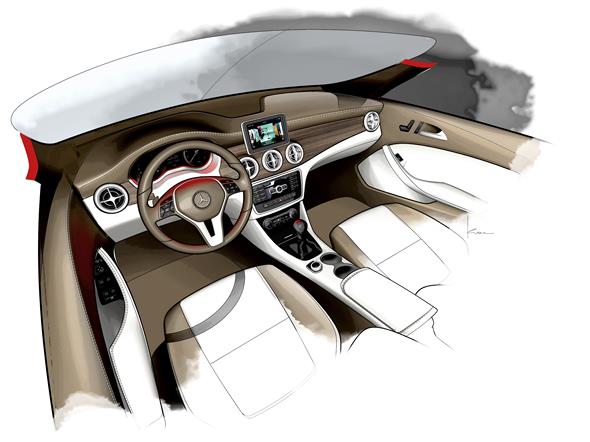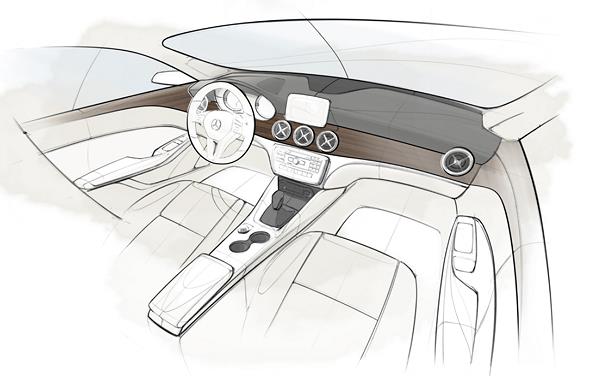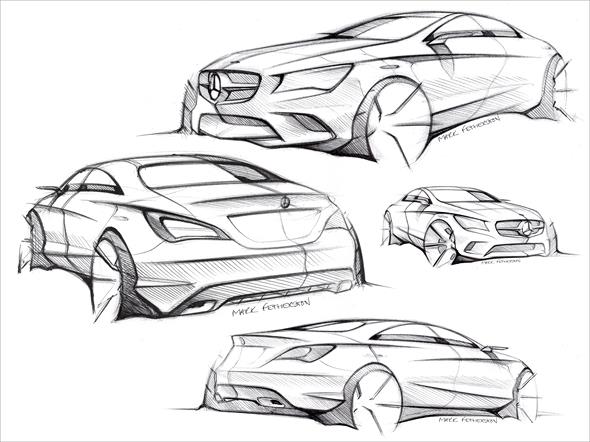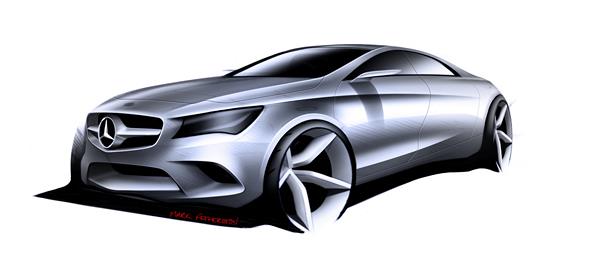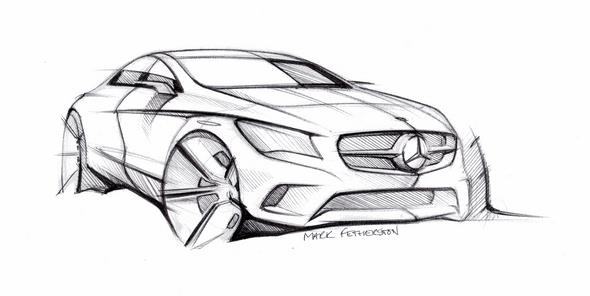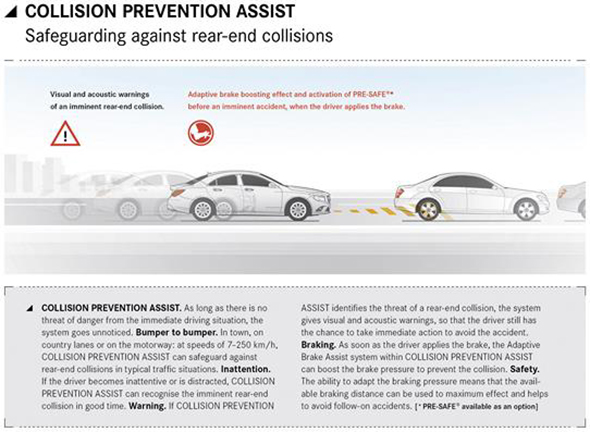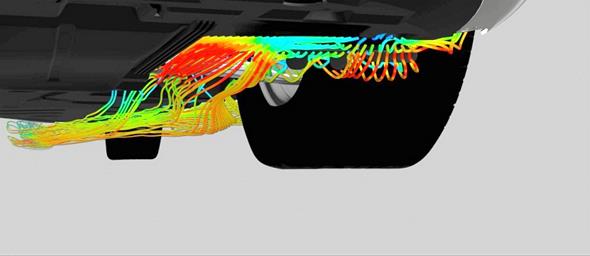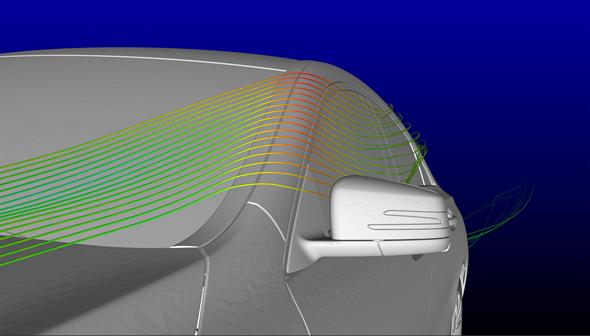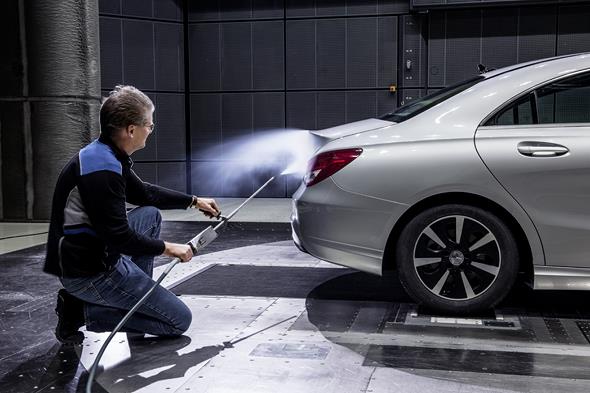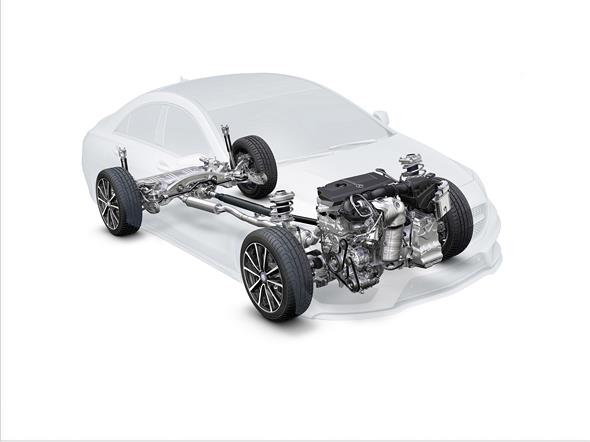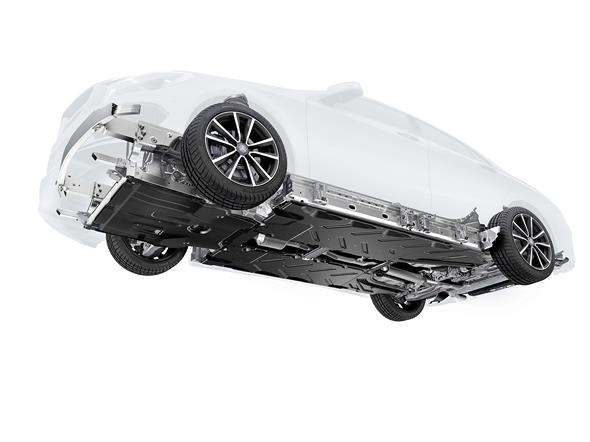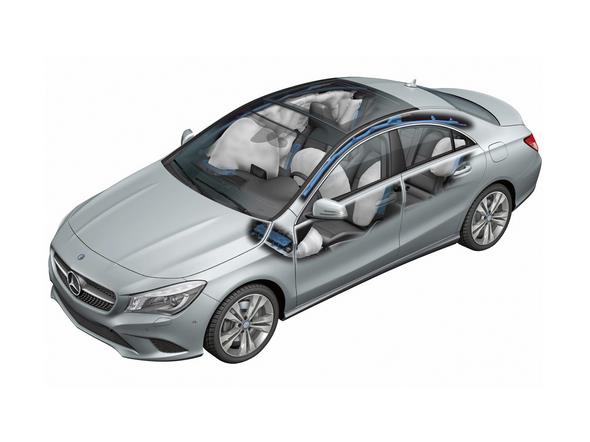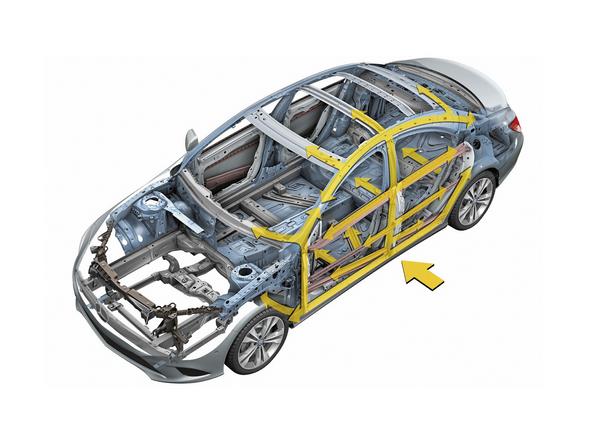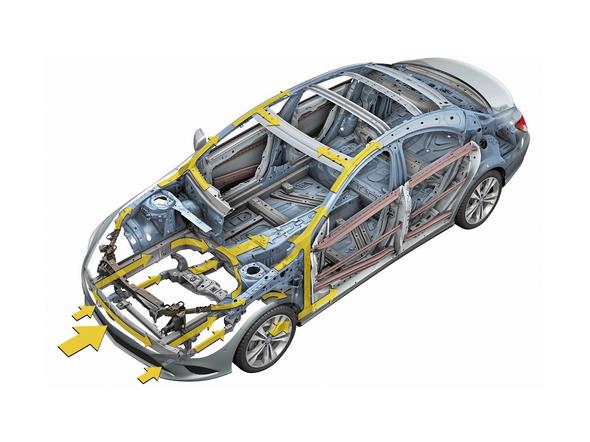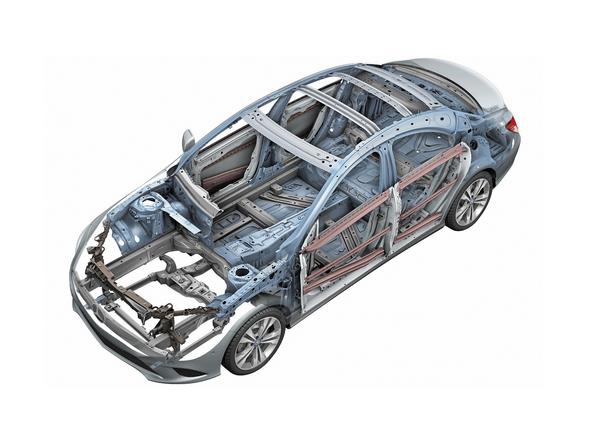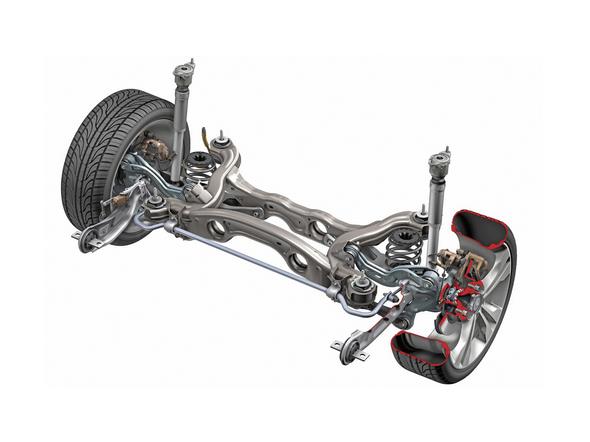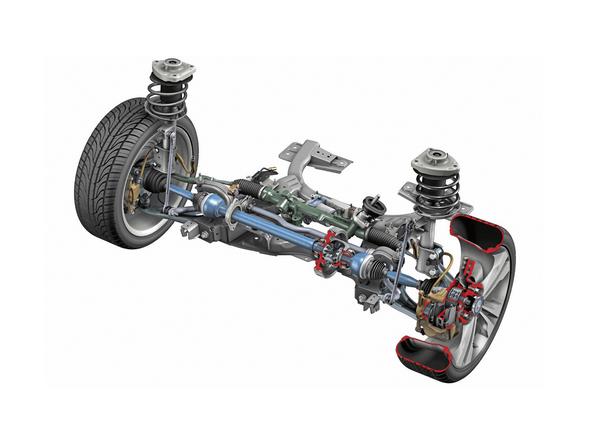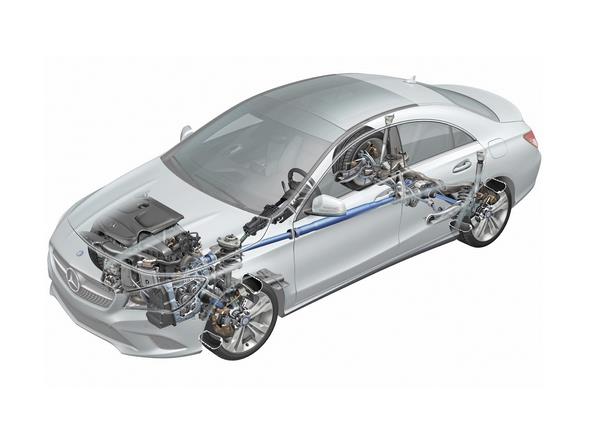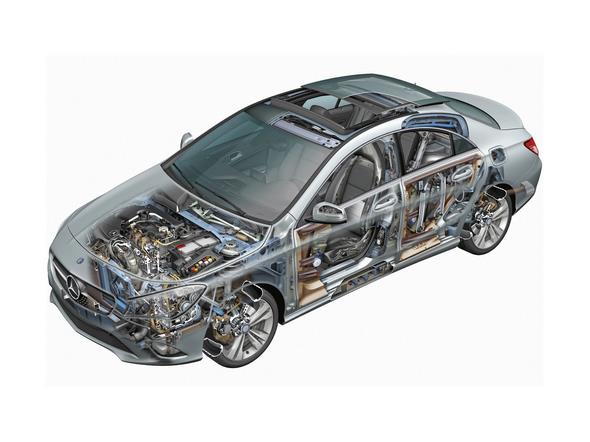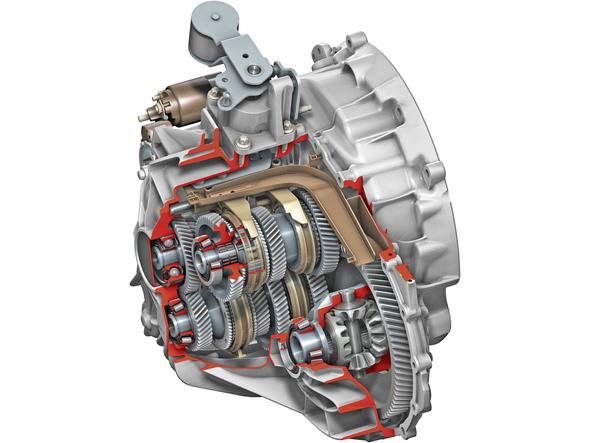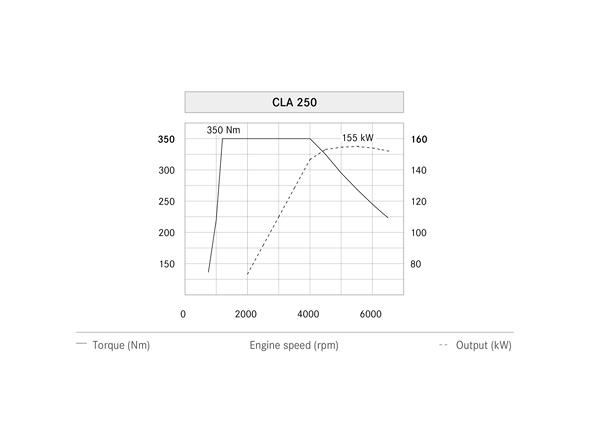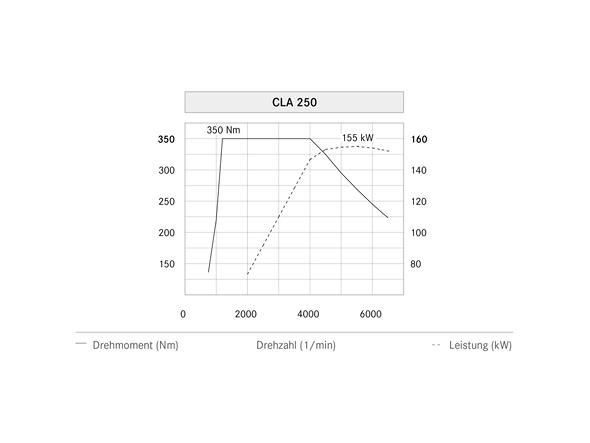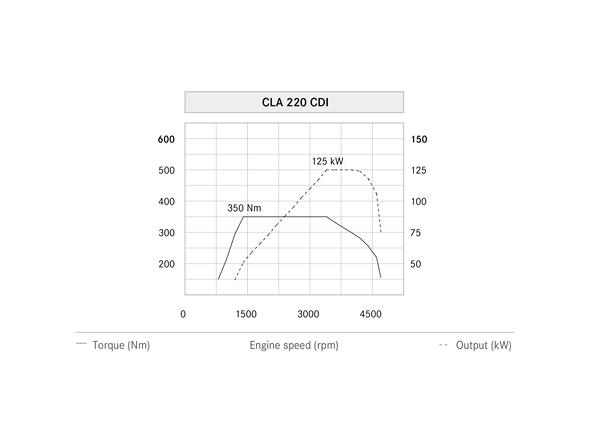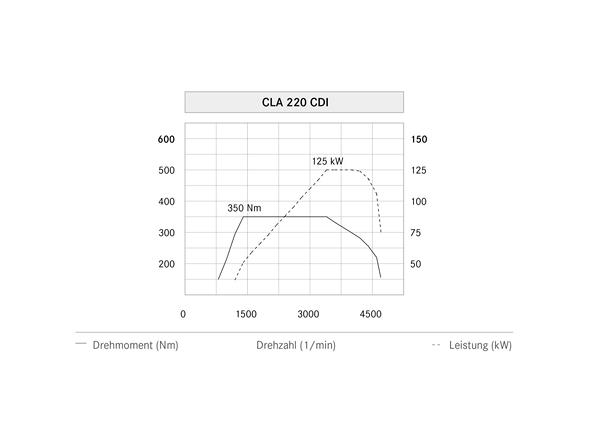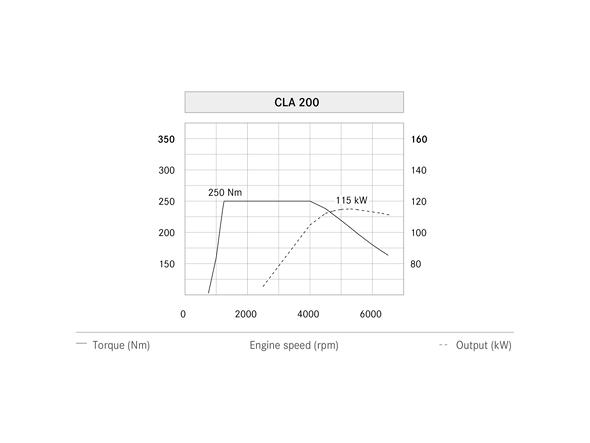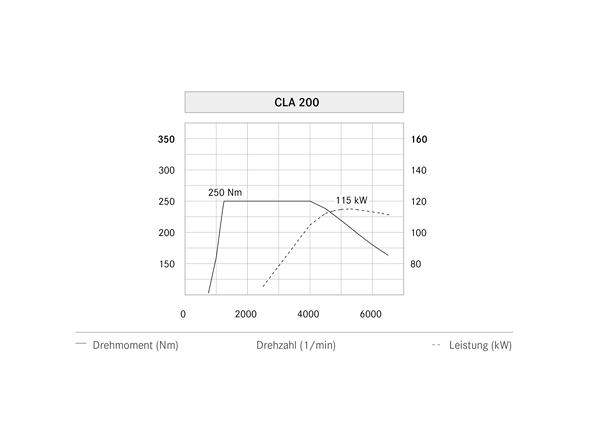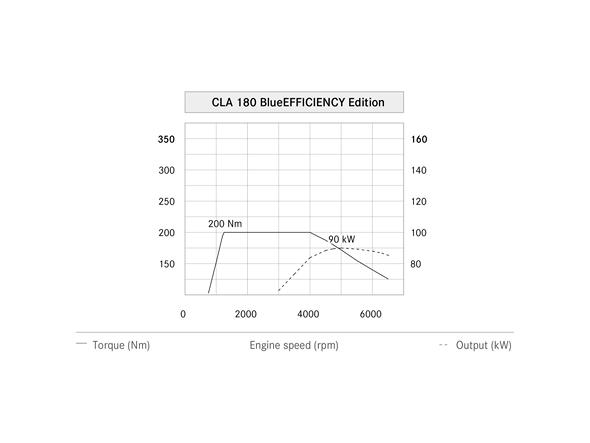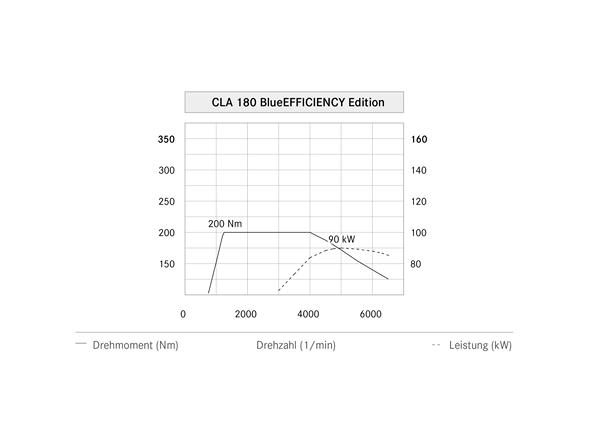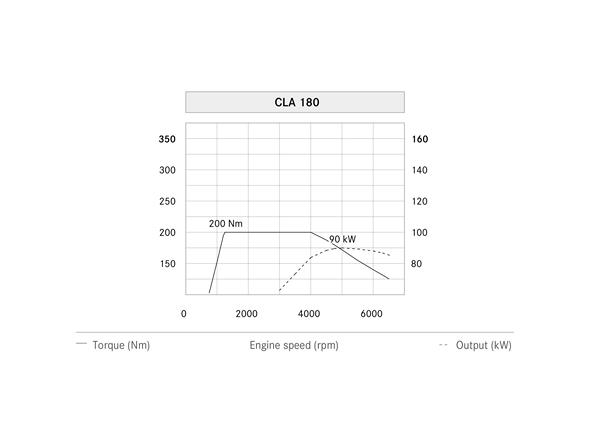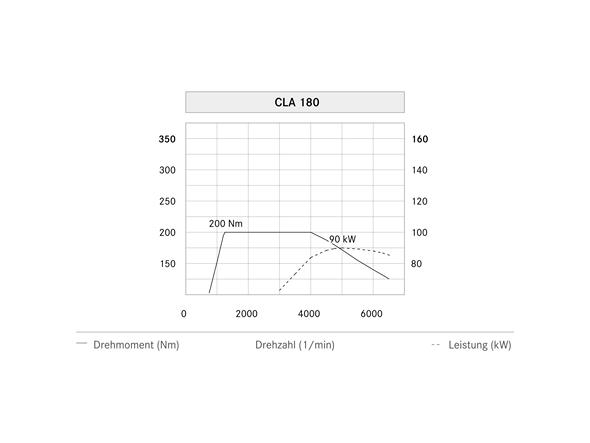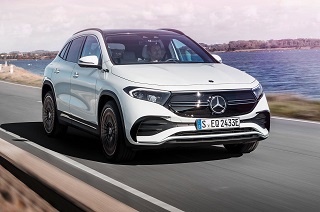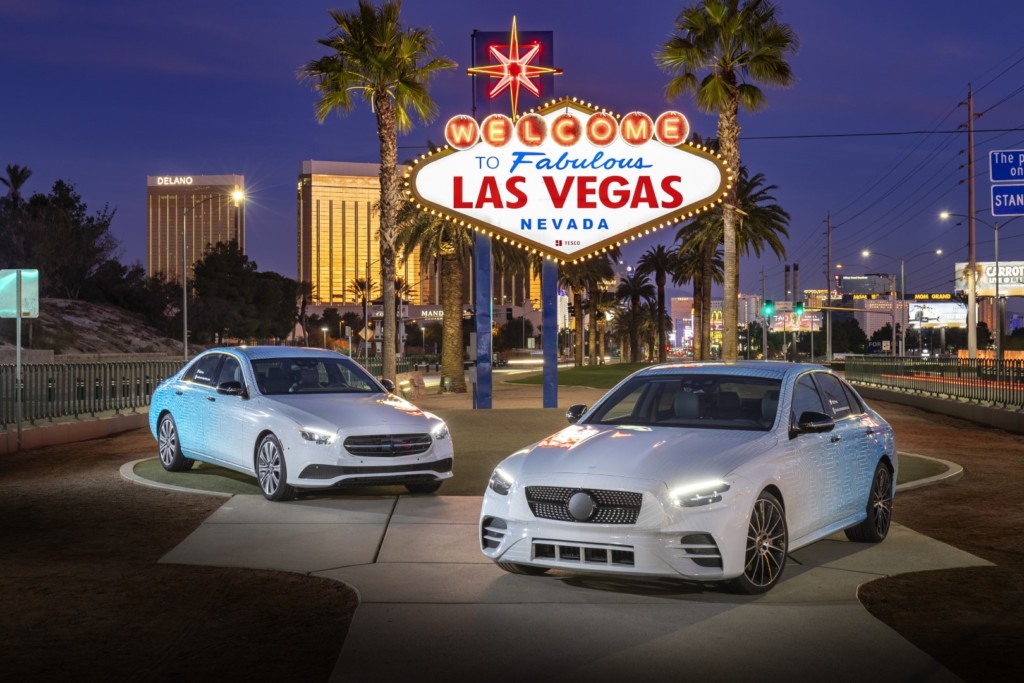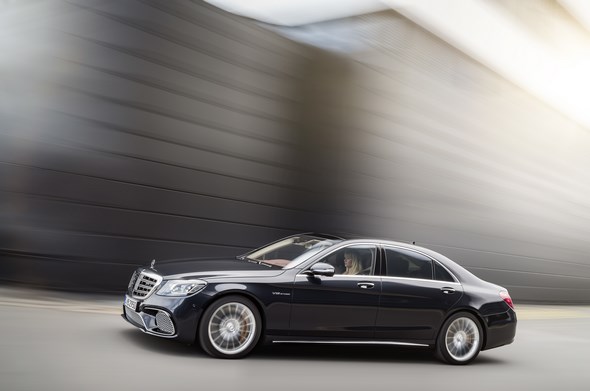Mercedes-Benz CLA-Class establishes new segment


Sleek as they come
The CLA is set to establish a new segment, with world-leading aerodynamics (Cd value of 0.22 for the BlueEFFICIENCY Edition), avant-garde coupé design and 4MATIC all-wheel drive (optional).
As a new four-door coupé it follows the idea of the CLS, whose design concept has spawned more than its fair share of imitators since its debut in 2003.
The newcomer features a radar-based braking system (COLLISION PREVENTION ASSIST) as standard which is able to warn the driver of an obstacle from a speed of 7 km/h and to initiate precision braking when the driver steps on the brake pedal.
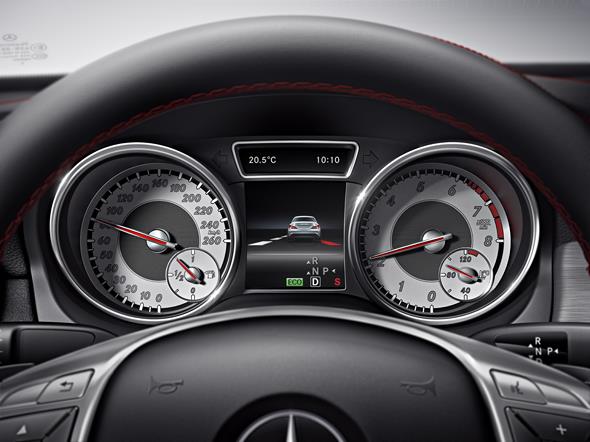
“The resonance created by the Concept Style Coupé was overwhelming. By far the most frequent comment heard was: ‘please put this car into series production’ And that’s exactly what we’re doing now”, said Dr Dieter Zetsche, Chairman of the Board of Management of Daimler AG and Head of Mercedes-Benz Cars. “The CLA is a car that does not confuse mid‑range with mediocrity. Its powerful design underscores the sporty side of the Mercedes-Benz brand.”
In keeping with its sporty positioning, the CLA is available with high-torque turbo engines rated at up to 155 kW (211 hp), sports suspension and 4MATIC all-wheel drive.
The technical highlights of this new design icon include a new world record in aerodynamics for series production automobiles (Cd value: 0.22) and numerous driving assistance systems, including the further-developed COLLISION PREVENTION ASSIST.
This radar-based assistance system provides the possibly distracted driver with visual and acoustic warnings of identified obstacles and prepares the adaptive Brake Assist system for precision braking.
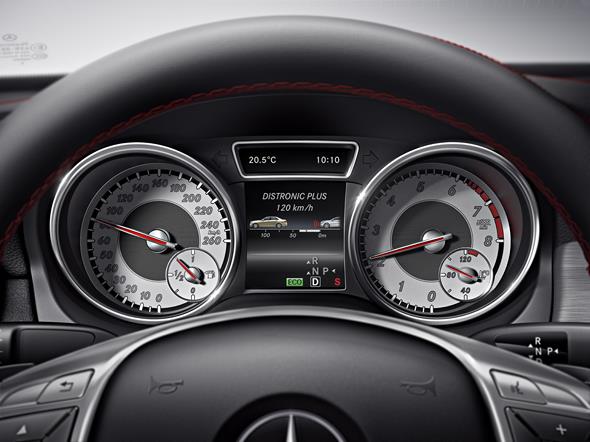
Braking is initiated as soon as the driver steps emphatically on the brake pedal. When an impending danger of collision is identified, the COLLISION PREVENTION ASSIST system calculates the precise braking force ideally needed to avoid an accident and makes the best possible use of any distance remaining.
As a new feature, COLLISION PREVENTION ASSIST affords protection from typical rear-end collisions in dangerous traffic situations in the CLA from a speed of only 7 km/h (previously: above 30 km/h).
Five lines and packages which vary greatly in character are available to individualise the striking compact mid-range coupé (length/width/height: 4630/1777/1437 millimetres). In keeping with the digital lifestyle of the CLA’s social media-savvy target group, smartphones can additionally be fully integrated into the vehicle’s display and operating system.
The CLA Edition 1 will only be available for twelve months. Among the exclusive equipment features of this model, which can be powered by any of the engine versions, the NEON ART interior with leather upholstery and black DINAMICA microfibre with yellow contrasting topstitching is worthy of mention.
The style rebel: exterior design
Its breathtakingly sporty proportions and powerfully dynamic design idiom, with its interplay between concave and convex surfaces give this four-door coupé its unmistakable look.
The vehicle’s striking features include the bonnet embedded in the front end with powerdomes and the diamond radiator grille. The light modules and LEDs behind the headlamp cover glass have been arranged in such a way as to create the characteristic “flare effect” for the daytime driving lights and indicators. This light signet defines the car’s energetic appearance and shapes a new Mercedes face.
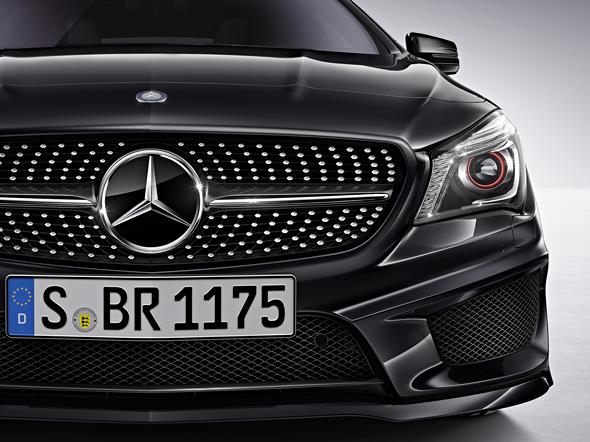
Numerous details indicate that on a design level the CLA represents a further development of the modern classic Mercedes-Benz CLS. Three prominent lines give structure to the vehicle when viewed from the side: the front structural edge over the wings flows towards the rear end in a characteristic dropping line.
Another, more sinewy line spans the shoulder muscle above the rear axle, while the third feature line extends in a sweeping curve from the front wheel towards the rear. Together, these lines lend depth and dynamism to the side profile.
The width-emphasizing rear end radiates power and athleticism, featuring an interplay between convex and concave surfaces and edges. The gently sloping roof contour and the pronounced, hallmark curvature of the rear window provide the CLA with a coupé-style character from the rear, too.
The athletic impression from the rear results from the drawn-in C-pillars in conjunction with the shoulder muscle over the rear wheel arch linings. The tail lights are framed by the muscular lines of the shoulders which extend into the rear end, the horizontal orientation of the lights emphasizing the rear’s powerful and aesthetic breadth. The light functions feature an arrow-style arrangement.
A large panoramic sliding sunroof is optionally available. This sunroof consists of a fixed polycarbonate cover at the front, a moving element made of mineral crystal and side trims to match the glass look.
“Cool touch” effect: the interior
The exterior’s progressive, sporty appearance is continued inside the vehicle. The interior additionally derives a very special quality feel from the design idiom, the selection of high-quality materials and the available combinations of materials. All trim surfaces are galvanised, resulting in a metallic finish.
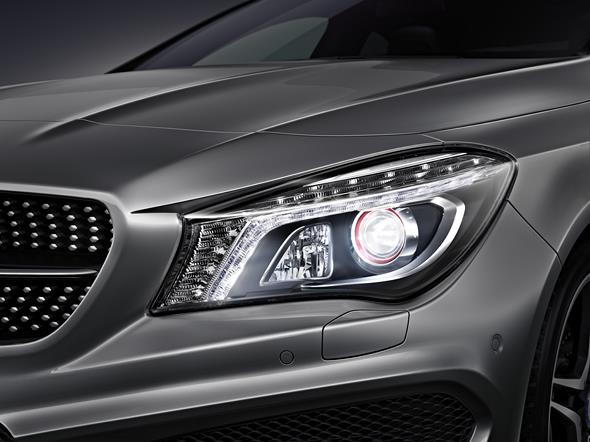
The instrument panel incorporates five round vents. The outer rings of the round vents have a high-quality electroplated finish. The airflow direction is governed by a galvanised insert that reveals a meticulous attention to detail. The free-standing display screen features a black piano-lacquer-look front panel and, in combination with COMAND Online a flush-fitting silver frame.
The CLA is fitted with integral seats in the front and rear, underscoring its sporty character. The rear bench seat emphasises the outer seats (2+1‑seater). Coloured contrasting stitching is available, according to the selected interior appointment options. A fibre-optic cable in the opening between head restraint and backrest is optionally available as part of the ambient lighting.
Sleek as they come: new record Cd value
With a Cd value of 0.23, the CLA sets a new benchmark – both within the Mercedes-Benz model range and among all production vehicles. The drag area, Cd x A – which is crucial to consumption at speeds above 60 km/h – also leads the field, at 0.51 m².
The CLA 180 BlueEFFICIENCY Edition, which is due to hit the streets in June and can be ordered now, even manages to better these top values with its Cd figure of 0.22, and when it comes to the drag area, Cd x A, the four-door coupé crosses a magical line: it is just 0.49 m2.
The good air flow characteristics, which are a major contributory factor to the vehicle’s low fuel consumption in everyday conditions, result from numerous aerodynamic optimisation measures. These include a low A-pillar shoulder with adapted A-pillar geometry, aerodynamically optimised exterior mirrors, streamlined rear section, wheels designed for low aerodynamic drag and serrated wheel spoilers on the front and rear wheel arches.
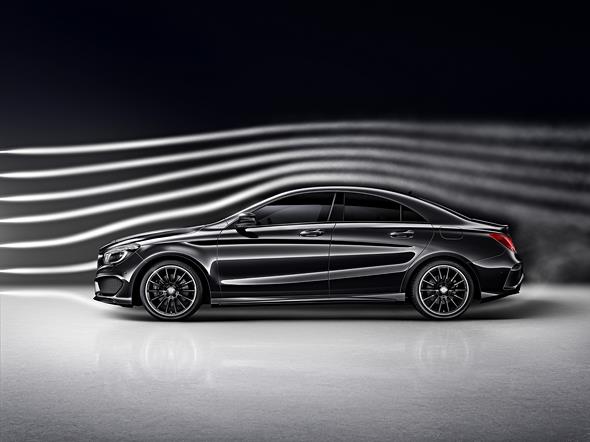
Extensive underbody panelling, additional panelling in the middle area of the rear axle and an aerodynamically optimised rear silencer followed by a diffuser improve the flow of air under the underbody.
When it comes to aeroacoustics too, i.e. noise level comfort, the four-door coupé is also at the top of its game.
Smart safety: advanced assistance systems
Numerous driving assistance systems offer support in the CLA and reduce the driver’s workload. Standard-fit features for the coupé include ATTENTION ASSIST drowsiness detection and radar-based COLLISION PREVENTION ASSIST with adaptive Brake Assist, which now helps to protect the CLA from collisions from a speed of only 7 km/h (previously: above 30 km/h).
This feature combines with DISTRONIC PLUS to become COLLISION PREVENTION ASSIST PLUS, incorporating an additional function: when a danger of collision persists and the driver fails to respond, the system is able to carry out autonomous braking at speeds of up to 200 km/h, thereby reducing the severity of collisions with slow or stationary vehicles.
The system also brakes in response to stationary vehicles at a speed of up to 30 km/h and is able to prevent rear-end collisions at speeds of up to 20 km/h.
Established assistance systems, such as the Lane Tracking package with Blind Spot Assist and Lane Keeping Assist or Adaptive Highbeam Assist, are also available for the CLA. Active Parking Assist (optional) enables automatic parking in lengthways and crossways parking spaces.
Designed for dynamism: the chassis and suspension
The chassis of the CLA features a McPherson front axle and an independent multilink rear suspension, featuring three control arms and one trailing arm per wheel. This means that longitudinal and lateral dynamics are virtually independent of one another.
A CLA-specific feature is the flexible decoupling of the rear axle carrier, which benefits ride comfort. Wheel carriers and spring links are made of aluminium, in order to reduce unsprung masses.
Two chassis and suspension set-ups are available: the comfort suspension and the optional sports suspension for sporty yet comfortable handling. The latter entails lowering of the body by 15 mm (front) and 10 mm (rear).

Irrespective of the selected chassis, all CLA variants come with the Direct Steer system. This electromechanical power steering offers improved feedback to the driver in comparison to conventional systems and makes an important contribution towards overall efficiency, as the steering assist function only requires energy when the steering wheel is actually turned.
Additionally it enables various steering assistance functions which are activated by the ESP® control unit. These include countersteering in case of oversteering, corrective steering when braking on road surfaces offering different levels of grip (split-friction braking), mitigation of the extent to which the front-wheel drive influences the steering and compensation for crosswind and road gradients.
High tractive power reserves and outstanding agility: 4MATIC all-wheel drive
The CLA from Mercedes-Benz is optionally available with a new generation of the 4MATIC permanent all-wheel drive system featuring fully variable torque distribution. Similar to the other 4MATIC versions, this completely new development boasts high tractive power reserves and outstanding agility combined with superlative driving safety and energy efficiency.
The components of the new 4MATIC include the power take-off to the rear axle which is integrated in the 7G-DCT automated dual clutch transmission and the rear-axle gear with integrated, electrohydraulically controlled multi-disk clutch.
This set-up enables fully variable distribution of the drive torque between front and rear axle. Additional benefits of this design are a lower system weight compared with what is available from the competition as well as high efficiency.
All set for the future: powerful and efficient drive
Ahead of the scheduled introduction of the Euro 6 regulation, all petrol-engine variants and the top diesel variant of the new Mercedes-Benz CLA already meet the future requirements of this European exhaust emissions standard.
The petrol engines with a displacement of 1.6 and 2.0 litres cover an output spectrum ranging from 90 kW (122 hp) in the CLA 180 through 115 kW (156 hp) in the CLA 200 to 155 kW (211 hp) in the CLA 250.
The two diesel engines combine dynamic low-end torque with the utmost efficiency: the CLA 200 CDI generates 100 kW (136 hp), with a maximum torque of 300 Nm (available from September 2013). The CLA 220 CDI has a displacement of 2.2 litres and delivers 125 kW (170 hp) and 350 Nm of torque, while emitting only 109 g of CO2 per kilometre.
All engines feature the ECO start/stop function as standard. The engines are combined with a six-speed manual transmission or with the 7G-DCT dual clutch automatic transmission, which reconciles comfort and sportiness in inimitable fashion.
An overview of the models and prices:
| Model | CLA 180 | CLA 180 BE Edition 3 | CLA 200 | CLA 250 | CLA 200 CDI5 | CLA 220 CDI | |
| Petrol, direct injection | Diesel, direct injection | ||||||
| Displacement | cc | 1595 | 1595 | 1595 | 1991 | 1796 | 2143 |
| Transmission | 6-speed | 6-speed | 6-speed | 7G-DCT | 6-speed | 7G-DCT | |
| Output | kW (hp) | 90 (122) | 90 (122) | 115 (156) | 155 (211) | 100 (136) | 125 (170) |
| Max. torque | Nm | 200 | 200 | 250 | 350 | 300 | 350 |
| Fuel consumption, combined | l/100 km | 5.4 – 5.6 | 5.0 | 5.5 – 5.7 | 6.1 – 6.2 | n/a | 4.2 – 4.5 |
| CO2 emissions1 | g/km | 126 – 130 | 118 | 127 – 131 | 142 – 144 | n/a | 109 – 117 |
| Acceleration0 – 100 km/h | s | 9.3 | 9.9 | 8.6 | 6.7 | 9.4 | 8.2 |
| Top speed | km/h | 210 | 1904 | 230 | 240 | 220 | 230 |
| Price2 | Euros | 28,977 | 28,977 | 31,862 | 38,675 | n/a | 37,991 |
1 combined, 2 sales price in Germany, incl. 19 percent VAT, 3 BE = BlueEFFICIENCY, 4 electronically limited, 5 available from September, n/a = no data available yet
“Always on”: the multimedia systems
The latest multimedia generation deployed in the CLA boasts new functions, additional apps and a modified graphic colour scheme.
Daimler’s Digital Drive Style app concept, which together with the Drive Kit Plus for the iPhone® enables seamless integration of the iPhone® into the vehicle, has been extended.
The highlights include Siri voice control and Glympse real-time location sharing. Glympse enables the user to share his or her current location with selected persons.
Other functions are Facebook®, Twitter®, internet radio, AUPEO!™ Personal Radio and the advanced navigation solution from Garmin® with web-based real-time traffic information, online special destination search including Street View™ and 3D map display.
The COMAND Online multimedia system has also been extended. The latest generation offers improved, photo-realistic map display, an additional Bluetooth® profile (to enable the internet to be accessed via iPhone®, for example), the display of images additionally in bmp and png formats and the real-time transfer of traffic data.

The design
The style rebel
Its breathtakingly sporty proportions and powerfully dynamic design idiom, with its interplay between concave and convex surfaces give this four-door coupé its unmistakable look.
The vehicle’s striking features include the bonnet embedded in the front end with powerdomes and the diamond radiator grille. The light modules and LEDs behind the headlamp cover glass have been arranged in such a way as to create the characteristic “flare effect” for the daytime driving lights and indicators.
This light signet defines the car’s energetic appearance and shapes a new Mercedes face.
Numerous details indicate that on a design level the CLA represents a further development of the modern classic Mercedes-Benz CLS. Three prominent lines give structure to the vehicle when viewed from the side: the front structural edge over the wings flows towards the rear end in a characteristic dropping line.
Another, more sinewy line spans the shoulder muscle above the rear axle, while the third feature line extends in a sweeping curve from the front wheel towards the rear. Together, these lines lend depth and dynamism to the side profile.
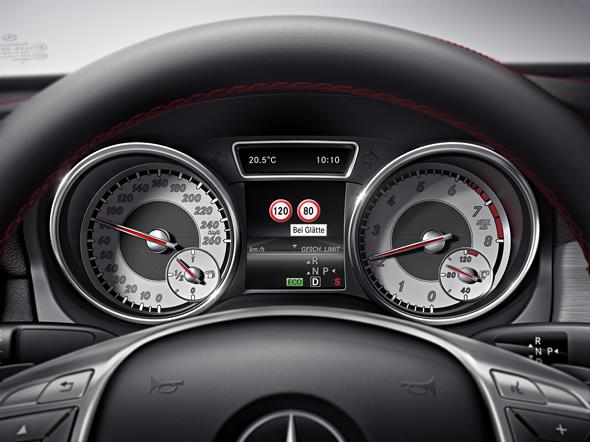
The width-emphasizing rear end radiates power and athleticism, featuring an interplay between convex and concave surfaces and edges. The gently sloping roof contour and the pronounced, hallmark curvature of the rear window provide the CLA with a coupé-style character from the rear, too.
The athletic impression from the rear results from the drawn-in C-pillars in conjunction with the shoulder muscle over the rear wheel arch linings. The tail lights are framed by the muscular lines of the shoulders which extend into the rear end, the horizontal orientation of the lights emphasizing the rear’s powerful and aesthetic breadth. The light functions feature an arrow-style arrangement.
A large panoramic sliding sunroof is optionally available. This sunroof consists of a fixed polycarbonate cover at the front, a moving element made of mineral crystal and side trims to match the glass look.
Electroplated trim elements: the interior
The exterior’s progressive, sporty appearance is continued inside the vehicle. The interior additionally derives a very special quality feel from the design idiom, the selection of high-quality materials and the available combinations of materials.
The instrument panel incorporates five round vents. The outer rings of the round vents have a high-quality electroplated silver-chrome finish. The airflow direction is governed by a galvanised insert that reveals a meticulous attention to detail.
The free-standing display screen features a black piano-lacquer-look front panel and, in combination with COMAND Online a flush-fitting silver frame.
The CLA is fitted with integral seats in the front and rear, underscoring its sporty character. The rear bench seat emphasises the outer seats (2+1‑seater). Coloured contrasting stitching is available, according to the selected interior appointment options. A fibre-optic cable in the opening between head restraint and backrest is optionally available as part of the ambient lighting.
The model range
Sporty and exclusive
With the “Urban” and “AMG Line” equipment lines, three design packages and numerous other optional extras, the CLA can be personalised to suit every taste. The CLA Edition 1 will only be available for twelve months.
Among the exclusive equipment features of this model, which can be powered by any of the engine versions, the NEON ART interior with leather upholstery and black DINAMICA microfibre with yellow contrasting topstitching is worthy of mention.
With air conditioning, 3-spoke multifunction steering wheel with 12 function buttons, steering column adjustable in height and longitudinal direction, green-tinted heat-insulating glass, Audio 20 CD radio with dual tuner, colour display and MP3- WMA- AAC-capable CD drive, six speakers as well as Aux-in socket and USB interface in the centre armrest for external audio and video devices, even the standard equipment of the new CLA-Class is particularly generous. A colour display between the two large dials in the instrument cluster is likewise standard ex-factory for the CLA.
In addition, numerous driving assistance systems offer support for the driver. Standard-fit features for the coupé include ATTENTION ASSIST drowsiness detection and radar-based COLLISION PREVENTION ASSIST with adaptive Brake Assist, which now helps to protect the CLA from collisions from a speed of only 7 km/h (previously: over 30 km/h).
With the equipment lines “Urban” and “AMG Line”, three design packages and optional extras, it is possible to individualise the coupé further.
Two types of character: the equipment lines
The “Urban” equipment line can be combined with all the engine variants, except the CLA 180 BlueEFFICIENCY Edition. Its dynamic impression comes courtesy of the sports seats with their upholstery in ARTICO man-made leather/Corumba fabric. Seats, armrests, multifunction steering wheel and gearshift lever are in nappa leather.
The 3-spoke leather steering wheel features perforations in the grip area. The seating comfort package, the multifunction switch on the centre console and the 12-V power outlet in the vehicle rear are all part of the standard equipment scope.
Trim elements in silver wave-look (alternatively anthracite wave-look), with matching air outlet vents with nozzle ring and cross in silver chrome. Characteristic exterior features are the diamond radiator grille (with black pins, silver-coloured louvre and insert in silver chrome) as well as the twin-pipe exhaust system with rectangular-section tailpipe trim in polished stainless steel.
A sports suspension with lowered vehicle body are standard features, however, a comfort suspension is also optionally available. The “Urban” design and equipment line rolls on 5-spoke 18-inch himalaya-grey light-alloy wheels.
“AMG Line” is the name of the second equipment line, available for all the versions of the vehicle with the exception of the CLA 180 BlueEFFICIENCY Edition. Here the emphasis is on the colour red: in the contrasting topstitching on the sports seats (upholstered in ARTICO man-made leather/DINAMICA microfibre), the multifunction sports steering wheel in nappa leather with flattened lower section, and the armrests.
Matching these appointments, the stainless steel sports pedals with rubber studs. This line features trim elements in light-tone longitudinal-grain aluminium. And the exterior is quite as sporty, too: the “AMG Line” features a twin-pipe exhaust system with rectangular-section tailpipes in polished stainless steel, a diamond-pattern radiator grille with silver pins, 5-twin-spoke AMG 18-inch titanium-grey high-sheen light-alloy wheels, AMG bodystyling (front and rear aprons, side sill panels).
If the customer chooses the “AMG Line”, he or she will also receive a CLA-Class with sports suspension and lowered vehicle body, perforated front brake discs and front brake callipers with “Mercedes-Benz” lettering.
Tailored-to-measure upgrades: the design packages
Three design packages, “Exclusive”, “AMG Exclusive” and “Night package” offer further individualisation possibilities. The “Exclusive” package which can be chosen in addition to one of the two design and equipment lines, with its extremely select, high-level interpretation of this vehicle segment does all honour to its name, with sports seats upholstered in leather, dashboard and door centre panels in ARTICO man-made leather and trim elements in trapezium-grain aluminium.
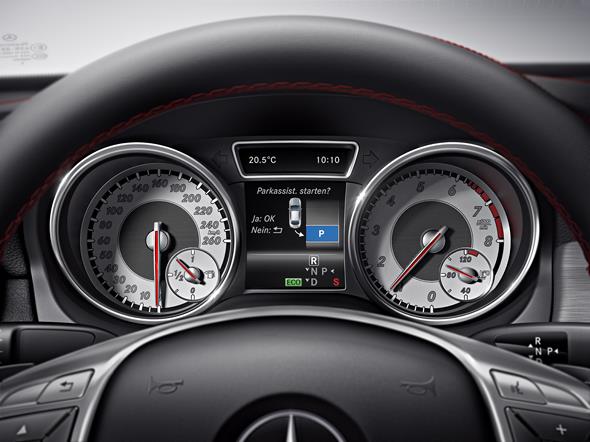
The beltlines are also in ARTICO man-made leather. A 3-spoke leather-clad steering wheel with 12 function buttons is standard equipment, as is the 4-way adjustable lumbar support for the front seats and the seat heating. The locking system includes an infra-red receiver in the driver’s door as well as the convenience closing system that allows the side windows and the panoramic sliding sunroof to be comfortably opened and closed using the car key.
The “AMG Exclusive package“, which is only available in conjunction with the “AMG Line”, features the following details:
- ·heated front sports seats with black RED CUT leather upholstery with red contrasting stitching as well as 4-way lumbar support
- ·dashboard in ARTICO man-made leather with red contrasting topstitching and air vents with silver-chrome surrounds and crosses
- ·aluminium trim elements with light-tone longitudinal-grain
- ·cover over the stowage compartment in the centre console
- ·closing system with infra-red receiver in driver’s door and convenience closing feature
- ·Shoulderline in ARTICO man-made leather with red contrasting topstitching and wrap-around look
- ·3-spoke nappa leather multifunction sports steering wheel with red contrasting topstitching, perforations in grip area and flattened lower section
The “Night package” is based on the “Urban“ or “AMG Line” design and equipment lines, and offers this special exterior features:
- black-painted exterior mirrors (in conjunction with cosmos black metallic paint finish in vehicle colour)
- beltline trim strip and window surrounds in high-gloss black
- black radiator louvres
- heat-insulating dark-tinted glass as of B-pillar
- 18-inch 5-twin-spoke light-alloy wheels painted in black and with a high-sheen finish (in conjunction with AMG Line: AMG 5-twin-spoke light-alloy wheels)
From ‘A’ for accessories to ‘X’ for xenon: additional optional extras
The CLA-Class is optionally available with bi-xenon lights instead of halogen lights. Bi-xenon lights are furthermore optionally combinable with the Intelligent Light System (ILS). ILS, which is familiar from other Mercedes model lines, comprises bi-xenon headlamps with variable light distribution and dynamic headlamp range for country roads, motorways and dense fog, Adaptive Highbeam Assist, active light function, LED daytime driving lights and headlamp cleaning system.
In conjunction with “AMG Line”, the ILS customer receives a car featuring red headlamp internal rings that enhance the “angry look” and remind one of the red eyes of the Concept Style Coupé
A further highlight is the electric panoramic sliding sunroof with electric roller sunblind featuring obstruction sensor
The Light and Sight package comprises the following details:
- single-tone ambient lighting (indirect illumination of front and rear door handles/door openers and footwell lighting at front and rear)
- illuminated vanity mirrors for driver and front passenger
- illuminated interior mirror
- illuminated stowage compartment in the centre console
- reading lights and console light in the roof lining in the rear
- illuminated door sill panels
- courtesy and warning lights for driver and front passenger
- warning and background light on the boot lid
- windscreen wiper with rain sensor (in conjunction with sports seats)
- illuminated of opening between head restraints in vehicle front and rear
- automatic rain closing function for vehicles with panoramic sliding sunroof
A reversing camera is optionally available starting with the Audio 20 CD. This is activated automatically when reverse gear is engaged. It supports the driver during lengthways and crossways parking manoeuvres by means of static and dynamic guide lines indicating the vehicle’s line of travel and clearances.
Active Parking Assist offers even greater comfort here (see section “Driving assistance systems”).
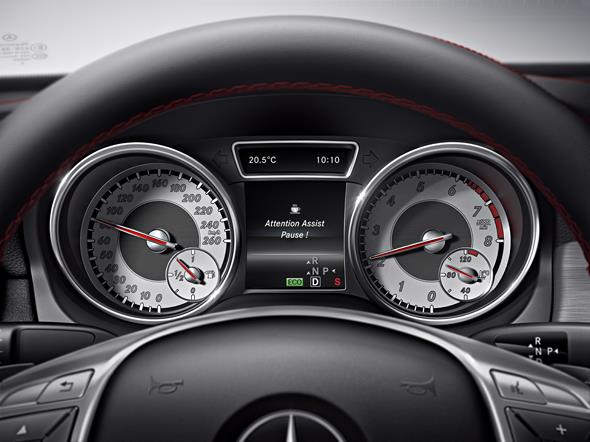
As standard equipment on board every CLA-Class, there is a THERMATIC manual-control air conditioning. The THERMOTRONIC two-zone automatic climate control system is available as an option.
Further optional extras include, among other things, front seats with Memory function, automatically dimming interior and exterior mirrors, an auxiliary heating system, a folding trailer coupling (from June 2013) and a stowage facility package.
The latter consists of a spectacles compartment in the overhead control panel, stowage boxes beneath the front seats, a 12-V power outlet and luggage nets on the front seat backrests and at the sides of the front footwells.
Exclusive for the launch: Mercedes-Benz CLA Edition 1
With the CLA-Class, Mercedes-Benz continues its series of exceptional Edition 1 special models. Limited to the first year after market introduction, the Edition 1 combines special equipment features that underscore the sportiness and exclusivity of the four-door coupé.
These features include paint finishes in mountain grey, night black, cirrus white or designo polar silver magno (due to be available from the 3rd quarter of 2013). AMG front and rear aprons and side sill panels in combination with the black-painted multi-spoke AMG light-alloy wheels create a powerful presence.
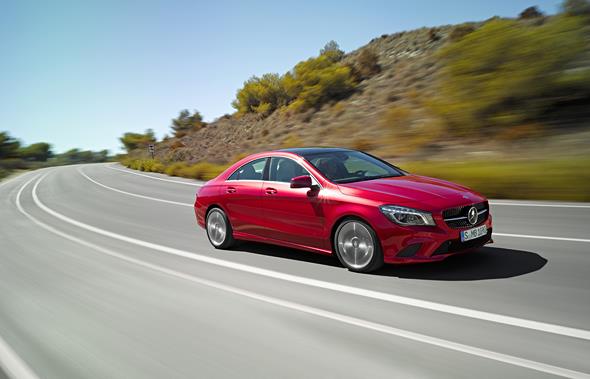
The diamond radiator grille in silver features a black louvre and chrome inserts. Bi-xenon headlamps are standard, as is the sports suspension with lowered body.
Exclusively reserved for the special model: the NEON ART interior, with sports seats upholstery in black leather/DINAMICA microfibre, yellow topstitching providing a very special contrast. Dashboard and beltlines are in ARTICO man-made leather with yellow topstitching in wrap-around look.
Trim elements in longitudinal-grain aluminium and a 3-spoke nappa leather multifunction sports steering wheel with a flattened lower section and perforations in the grip sector all round off the vehicle’s dynamic presence.
Aerodynamics
Sleek as they come
With record-breaking aerodynamics, the new CLA-Class combines emotion with efficiency. In respect of its aeroacoustics, i.e. noise level comfort, the four-door coupé is also at the top of its game.
With a Cd value of 0.23, the CLA sets a new benchmark – both within the Mercedes-Benz model range and among all production vehicles. The drag area, Cd x A – which is crucial to aerodynamic resistance – also leads the field, at 0.51 m².
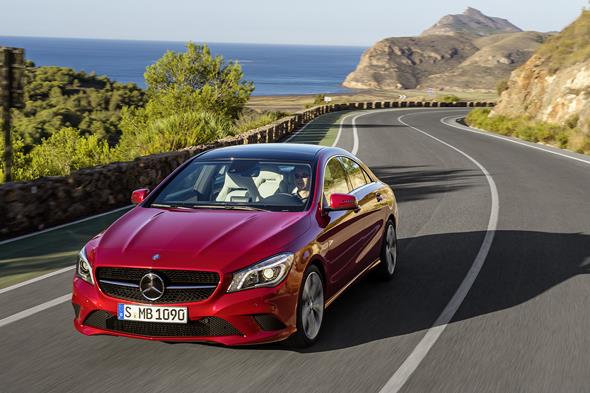
The CLA 180 BlueEFFICIENCY Edition, which is due to hit the streets in June, even manages to better this value with its Cd value of 0.22, and when it comes to the drag area, the four-door coupé crosses a magical line with its 0.49 m2. This makes the CLA-Class more streamlined than any other car.
The good air flow characteristics, which are a major contributory factor to the vehicle’s low fuel consumption in everyday conditions, result from numerous aerodynamic optimisation measures.
These include a low A-pillar shoulder with adapted A-pillar geometry, aerodynamically optimised exterior mirrors, wheel trim designed for low aerodynamic drag or a specially-developed aero light-alloy wheel and serrated wheel spoilers on the front and rear wheel arches.
The patented wheel spoiler was developed with the help of airflow analysis. This seemingly innocuous component reduces undesirable air turbulence in the wheel arches in no less than three ways, by lowering linear turbulence, deflecting the airflow from the wheels and stabilising shear waves with its serrated edge. The wheel spoiler remains effective whatever the suspension level and wheel dimensions.
Extensive underbody panelling, additional panelling in the middle area of the rear axle and an aerodynamically optimised rear silencer followed by a diffuser improve the flow of air under the underbody.
In addition the new CLA offers the lowest level of wind noise in its segment. Numerous measures contribute to make this possible:
- ·Frameless doors with a multi-stage sealing concept
- ·The high insulating effect of the side windows
- ·Form-optimised exterior mirrors
Exterior noise is also minimised by the reduced height of the A-pillar shoulder.
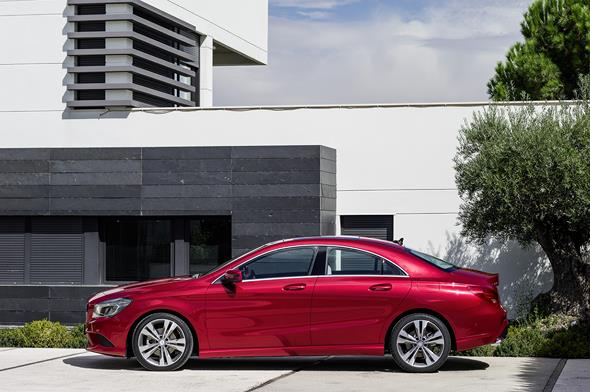
Contribution to active safety: anti-soiling measures
Anti-soiling measures are another aerodynamic discipline – and another area in which aerodynamics specialists at Mercedes-Benz have worked painstakingly on the CLA. Soiling can arise from rain, vehicles travelling ahead and spray thrown up by the vehicle’s own wheels.
Keeping windows and exterior mirror lenses as clean as possible, and therefore having the best possible visibility under all conditions, makes a contribution to active safety.
In the wind tunnel the aerodynamic specialists optimise components with the help of a fluorescent liquid which makes the soiling clearly visible. The aim is to direct water away so that the side windows and exterior mirror lenses remain clean.
This is influenced by the geometry of the A-pillar with its integral components and the geometry of the exterior mirrors and trim strips in the frameless doors.
For example, the side windows: by means of minor geometrical changes of the mirror housings and optimisation in detail, with seals and a special water-capture runnel, soiling has been significantly reduced.
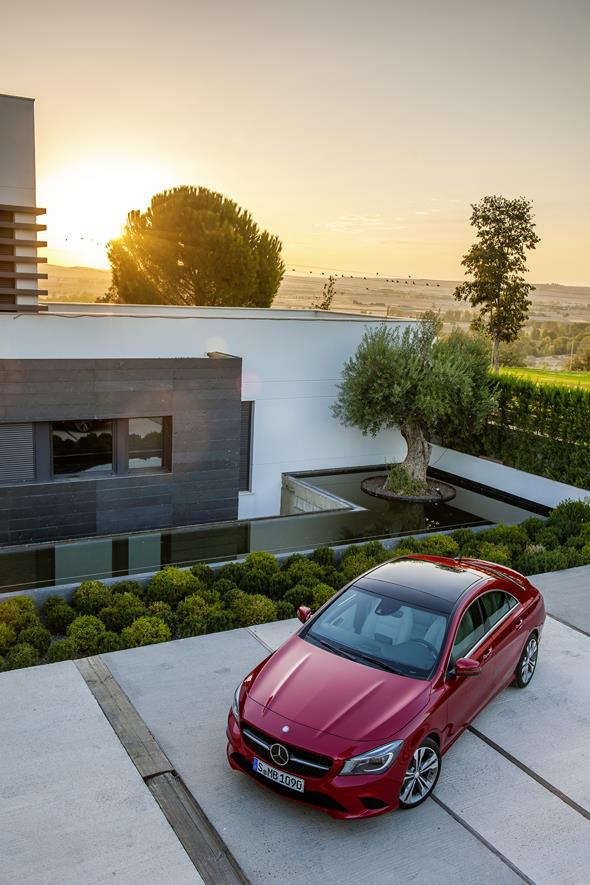
The Mercedes-Benz management team on the CLA-Class
“Breathtaking proportions”
“We are transferring the expressive design of the Concept Style Coupé seamlessly into series production. With its unmistakable design idiom, I am convinced that the CLA will significantly form the Mercedes-Benz brand image.”
Dr Dieter Zetsche, Chairman of the Board of Management at Daimler AG and Head of Mercedes-Benz Cars
“Everything is quite different – and yet the CLA remains true to Mercedes-Benz’s core values by setting new standards in aerodynamics, efficiency and driving assistance systems.”
Prof Dr Thomas Weber, Member of the Daimler Board of Management responsible for Group Research and Head of Mercedes-Benz Cars Development
“We aim to reach new target groups with the CLA – including those who never intended driving a Mercedes.”
Dr Joachim Schmidt, Member of the Management Board of Mercedes-Benz Cars, Sales and Marketing
“The dynamic design idiom is manifested in breath-taking proportions, muscular, flowing contours and sculptural surfaces. The CLA is a style rebel.”
Gorden Wagener, Head of Design, Mercedes-Benz Cars
The driving assistance systems
More sophisticated collision warning system as standard
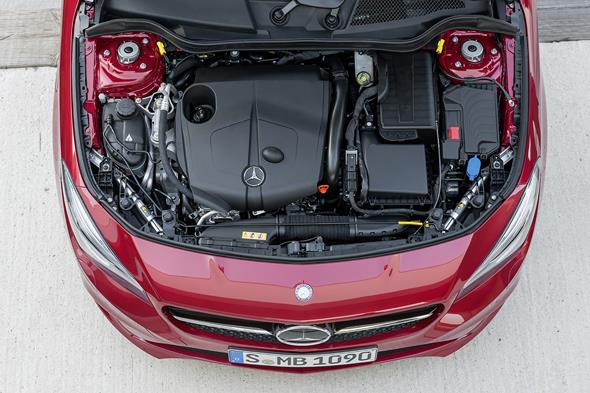
Numerous driving assistance systems offer support in the CLA and reduce the driver’s workload. Standard-fit features for the coupé include ATTENTION ASSIST drowsiness detection and radar-based COLLISION PREVENTION ASSIST with adaptive Brake Assist, which now helps to protect the CLA from collisions from a speed of only 7 km/h (previously: over 30 km/h).
The radar-based COLLISION PREVENTION ASSIST system provides the possibly distracted driver with visual and acoustic warnings of identified obstacles and prepares Brake Assist for precision braking.
Braking is initiated as soon as the driver steps emphatically on the brake pedal. When an impending danger of collision is identified, COLLISION PREVENTION ASSIST calculates the precise braking force ideally needed to avoid an accident and makes the best possible use of any distance remaining.
As a new feature, COLLISION PREVENTION ASSIST affords protection from typical rear-end collisions in dangerous traffic situations in the CLA from a speed of only
7 km/h (previously: over 30 km/h).
COLLISION PREVENTION ASSIST combines with DISTRONIC PLUS to become COLLISION PREVENTION ASSIST PLUS, incorporating an additional function: when a danger of collision persists and the driver fails to respond, the system is able to carry out autonomous braking at speeds of up to 200 km/h, thereby reducing the severity of collisions with slow or stationary vehicles. The system also brakes in response to stationary vehicles at a speed of up to 30 km/h and is able to prevent rear-end collisions at speeds of up to 20 km/h.
Electronic helpers: all the other assistance systems at a glance
Active Parking Assist, which is available as an option for the CLA-Class, has been developed on the basis of the PARKTRONIC system familiar from other model series. Twelve ultrasonic sensors mounted in the front and rear bumpers measure potential longitudinal and transversal parking spaces at the left and right sides of the road.
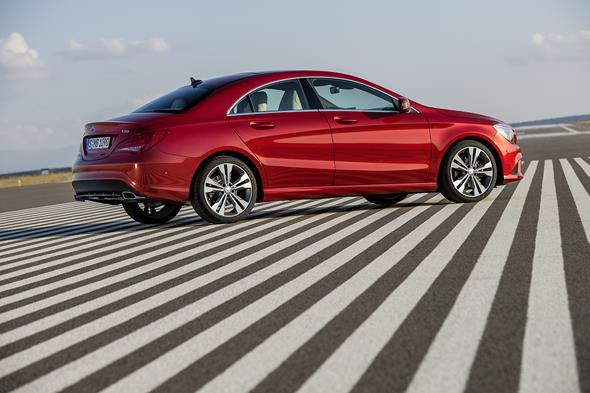
By default the system searches on the right; the turn indicator must be actuated for it to look on the left. Once a suitable space has been identified, the driver stops the vehicle, selects reverse gear and activates the automatic parking assistance system via the controls on the multifunction steering wheel.
The system calculates a suitable manoeuvring pattern with a maximum of seven moves to complete the parking operation. The driver is assisted by the automatic actuation of the electromechanical steering during the parking process but still has to operate the accelerator, gearshift and brake.
The speed is limited to 10 km/h during the parking process. Parking in spaces situated along slightly curved roads is also supported.
Automatic steering to exit the parking space is a new subfunction. If the vehicle has been parked using Active Parking Assist, the vehicle can be steered out of the longitudinal parking space in which the vehicle had previously been parked.
For this the driver has to engage reverse and actuate the turn indicator before activating – via control panel on the multifunction steering wheel – the automatic exit from parking space assistance.
Here, too, the driver has to operate the accelerator, brake and gearshift. As soon as the vehicle has assumed a sufficient angle to exit the parking space in one straight move, the wheels are set to the straight ahead position, the process ends and the driver assumes steering control again.
The process is completed at the latest when the vehicle is at an angle of 45 degrees relative to the starting position.

A series of further assistance systems can be added to this:
- Adaptive Highbeam Assist: when vehicles are detected ahead of or oncoming to the vehicle, this system automatically dips the beams and adjusts the range of the headlamps appropriate to the distance. The driver benefits from a longer dipped beam range and does not generally need to switch manually between main and dipped beam.
- Blind Spot assist: detects vehicles in the critical sector by means of two radar sensors located at the sides at the rear of the vehicle. The system warns the driver of the presence of a vehicle by displaying a red triangle in the exterior mirror. If the turn indicator is actuated the red triangle begins to flash and a warning tone is emitted.
- Lane Keeping Assist: a camera behind the windscreen detects carriageway markings and can recognise if the car is about to leave a detected lane unintentionally.
- ATTENTION ASSIST (standard): provides a warning when typical signs of drowsiness are detected. The system’s highly sensitive sensors observe the driver’s behaviour and can recognise – especially on the basis of how the steering wheel is being moved – if the driver is becoming drowsy or inattentive.
- Speed Limit Assist: a camera fitted behind the windscreen detects speed limit signs at the roadside and compares this data to information contained in the GPS system or the digital map. The relevant speed limit is then displayed in the instrument cluster.
- Brake hold function: when stopping, for example at traffic lights, the driver merely has to press the brake pedal slightly more firmly. They can then take their foot off the brake pedal and the brake will remain engaged until they move off again. The brake is released automatically when the driver steps on the accelerator.
- Hill-Start Assist: this function is able to prevent the vehicle from rolling back unintentionally when moving off on an uphill slope.
- Reversing camera: integrated in the handle strip on the tailgate, the reversing camera features a wide-angle lens. When reverse gear is engaged, the image from the camera is transmitted to the screen of the Audio 20 system or the COMAND system. Static and dynamic guide lines assist the driver during manoeuvring.
- DISTRONIC PLUS: the radar-based adaptive cruise control supports the driver at speeds between zero and 200 km/h by maintaining the distance to the vehicles in front. In doing so it is able to apply the brakes to bring the vehicle to a complete standstill and also accelerate it again. As a result, the system is also particularly convenient in stop-and-go traffic. If the system detects that the distance is being reduced too quickly, it warns the driver with both visual and audible signals.
- Cruise control with SPEEDTRONIC: the cruise control maintains the preset speed. The additional SPEEDTRONIC function ensures that the stored speed is not exceeded. Both functions come as standard with the 7G-DCT dual clutch transmission and are optionally available for the models with manual transmission.
Passive safety
A protection programme for every case
“One star is all you need” – the Mercedes-Benz safety philosophy also applies to the new CLA-Class.
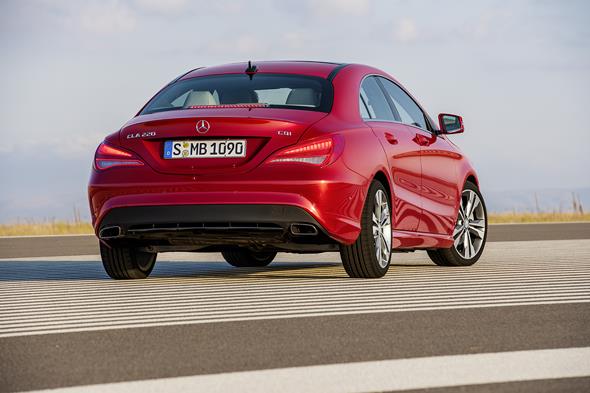
Its safety equipment includes belt tensioners and belt force limiters for the rear seats, too, the PRE-SAFE® anticipatory occupant protection system and the active bonnet for pedestrian protection. The line-up also includes seven airbags as standard and the Mercedes automatic emergency call system.
The new CLA-Class has passed the brand’s rigorous programme of crash tests. This includes not only some 30 different impact configurations, which are laid down as requirements for safety ratings and international type approval, but also nine proprietary crash tests, such as the roof-drop test or the pole impact test, developed by the brand itself.
The bodyshell structure provides the basis for the high standard of passive safety, both in terms of material and with regard to its structural design. Key features of the front-end structure are the systematic implementation of an available crash length, load distribution over several planes, the new bulkhead and floor concept and the subframe as a deformation element.
A total of three longitudinal member planes – consisting of the straight front longitudinal members with inserted crash boxes made from extruded aluminium box sections, a second, upper plane as prolongation of the load-bearing structure at the A-pillar node in the mirror triangle sector and a third plane at the bottom in front of the subframe – enable the controlled reduction of impact energy.
The subframe provides the torque support for the transverse engine/transmission block and serves to attach the components for the front axle and steering. It consists of several steel plates, some in ultra-high-strength steel, and a hydroformed tube.
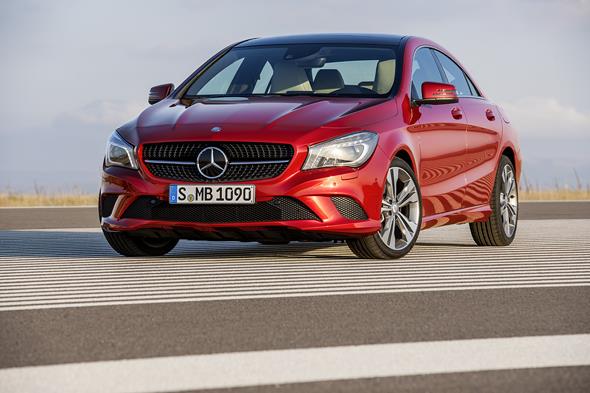
In order to optimise its deformation properties, the subframe is connected via two aluminium struts leading forward to the aluminium radiator mount located under the front end. In the event of a frontal impact, forces can be discharged at an early juncture into the subframe via this third load path, in order to ensure the best possible energy dissipation.
A plastic crash wedge which is fitted at the rear of the front wheel arches helps to ensure that the wheels do not slide under the front doors in the event of a high-impact crash, irrespective of the turning angles. This means that it will be possible to open the doors, even after a serious accident.
The bulkhead also incorporates a special feature: so-called “skate runners” in front of the two middle longitudinal members discharge forces into the floor. The continuous floor structure consists of a total of four straight longitudinal members. The tunnel roof reinforcements at front and rear combine with the tunnel to provide a further closed profile supporting the front end.
Protection in side-on crashes through controlled deformation
Rigid side structures and defined deformation management help to safeguard the survival space for occupants in the event of a side impact. Elements here include a member fitted diagonally in the rear footwell between centre tunnel and floor side wall which is intended to prevent the floor from being torn open in the event of side impact with a tree.
In the upper sector of the B-pillar high strength steels are used in order to ensure that as little intrusion as possible occurs, and that the passenger cell remains as intact as possible in the event of a side impact. In the lower sector, on the other hand, the B-pillar is designed to be softer, in order to enable energy reduction.
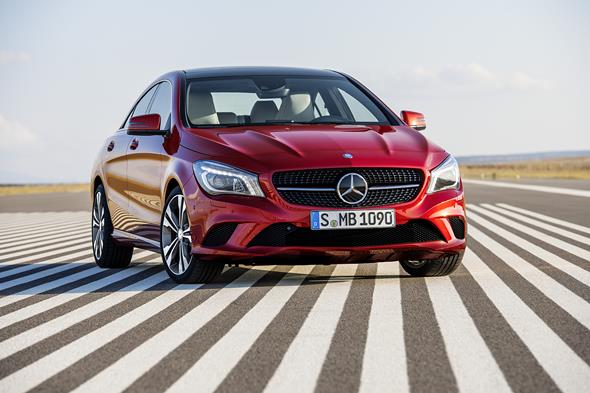
In this manner, deformation is directed to a few critical areas beneath the seating surface and transferred to the other vehicle side via the tubular structures in the front seats, transversal members and massive transmission bridge in the main floor.
Extensive pedestrian protection measures including Active Bonnet
The protection of those road users who are most at risk has always been a top priority during the development of Mercedes passenger cars. The new CLA-Class features numerous protective measures designed to help lessen the risk of injury to pedestrians.
In order to reduce the loads which arise in the event of a pedestrian impact on the bonnet of the vehicle, the deformation space between the bonnet and the components beneath it has been optimised. This is achieved in part through the appropriate positioning of components such as control units or fluid reservoirs in the engine compartment.
In the CLA-Class an active bonnet is also used. In the event of a pedestrian impact, sophisticated sensors combined with intelligent algorithms trigger actuators in the area of the bonnet hinges. These raise the bonnet by 60 millimetres.
The additional space which this creates between the bonnet and the components in the engine compartment means that a head is subject to comparatively low internal acceleration forces on impact.
The deformation characteristics of the bonnet have been developed specifically to meet these requirements. Reductions in the impact loads can be achieved by using aluminium and reinforcing the inside face of the bonnet.
Intelligent restraint systems
The CLA-Class protects its passengers with up to nine airbags. The standard complement comprises driver and front-passenger airbag, a kneebag for the driver, large thorax-pelvisbags incorporated in the seat to protect the chest, stomach and pelvis area and windowbags.
The windowbags extend over both rows of seats to the A-pillar triangle. They serve to protect the occupants’ heads from hard contact in the event of side impact and can also help to keep limbs inside the vehicle in an accident.
The driver and front passenger airbags operate in two stages, according to the expected severity of the impact. The gas generator first of all fills the driver’s airbag with 80 and the front passenger’s airbag with 60 per cent gas.
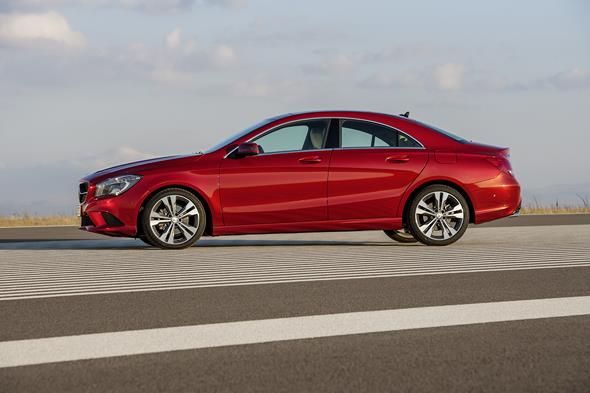
If a more severe impact is forecast, the second stage of the gas generator will additionally be activated after a delay and the airbags will be filled at a higher pressure level. Sidebags for the rear are optionally available.
The high safety expertise of the CLA-Class’s developers is reflected in a host of details. The deformable steering column yields by up to 100 millimetres when the driver exerts pressure on the airbag as a result of forward displacement in an accident, for example.
The comfort features also reveal a fine touch: the driver’s airbag is connected to a vibration absorber in the steering wheel to reduce vibrations, for example.
Comprehensive precautionary measures in the rear
In developing the new CLA-Class, the Mercedes-Benz safety experts have also attached great importance to the safety of the rear-seat occupants. The new model therefore meets the relevant requirements of the Japanese and Chinese NCAP institutes which also take account of factors such as the ease of use of the rear seat belts.
Experts believe that Euro NCAP will extend its rating programme to include rear-seat safety in the medium term. The CLA-Class is already prepared for this and is a role model in this respect – both within and beyond its own vehicle category – with features such as standard-fit belt tensioners and belt force limiters for the outer rear seats.
A torsion bar in the roller mechanism twists when the load on it exceeds a defined level. In this way the belt force is limited and with it the load on the seat occupant.

The CLA-Class’s features also include the standard-fit ISOFIX child seat securing system on the outer seats. Child seats can additionally be fixed to the vehicle by means of special anchorage points with top tethers.
PRE-SAFE® anticipatory occupant protection
The PRE-SAFE® anticipatory occupant protection system is available in the CLA-Class for the first time as an option. This represents a further step in the ongoing democratisation of this innovation, which was premiered in the S-Class in 2002.
PRE-SAFE® from Mercedes-Benz uses the time between detection of a potential accident situation and a possible collision to initiate preventive protection measures, thus reducing the loads exerted on the occupants in the event of a crash by up to 40 percent.
Core features of PRE-SAFE® are reversible belt tensioning, the closing of side windows and sliding sunroof when critical lateral dynamics are detected and adjustment of the fully electric front passenger seat with memory function to an ideal position for maximum effectiveness of the restraint systems.
PRE-SAFE® is activated when one of the following parameters is met: emergency braking, panic braking, pronounced over- or understeering,
critical steering movements or heavy support by adaptive Brake Assist.
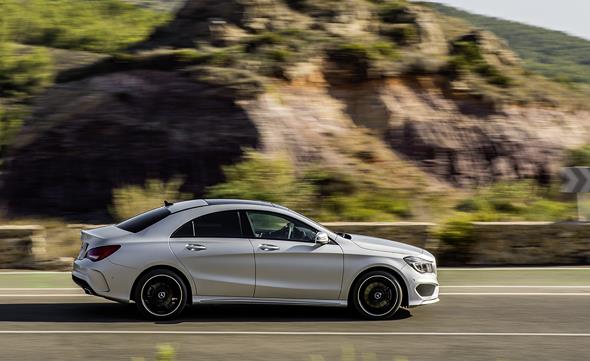
Automatic Mercedes-Benz emergency call
In combination with COMAND Online, the new CLA-Class is equipped with the Mercedes-Benz emergency call system. As long as COMAND Online is connected to a mobile phone, the Mercedes-Benz emergency call system can rapidly automatically alert the emergency services in the event of a serious accident.
After the airbags or the pyrotechnical belt tensioners are triggered, the vehicle’s exact GPS position and vehicle identification number (VIN) are sent by SMS to a special emergency centre, with positional data also being transmitted using the DTMF method (dual-tone multi-frequency) at the same time.

Even if the occupants are unconscious or unsure of exactly where they are because they are on a holiday trip, for example, the emergency services alerted by the emergency centre will be notified quickly with accurate information. The driver can also make the emergency call manually as “MB emergency call” is always the first entry in the system phone directory.
On receiving the call, the emergency centre establishes voice contact with the vehicle occupants in a matter of seconds. A particularly practical aspect in an emergency is that communication takes place not in the language of the country where the accident has occurred but in the language which the driver has preset in COMAND Online.
Other than any mobile phone communication charges, which would only arise in the event of an actual emergency call, no charges are incurred by the driver for the emergency call facility and no contractual relationship – other than the regular mobile phone contract – is required.
The diesel engines
From the S-Class to the CLA-Class
The CLA 220 CDI combines sporty handling with exemplary efficiency and already complies with the Euro 6 exhaust gas standard, which will only become mandatory from 2015. The ECO start/stop function is featured as standard. The CLA 200 CDI is due to follow in September.
Since its world premiere in 2008 the direct-injection diesel engine known as the OM 651 has been setting standards in terms of performance and torque characteristics, economy, emissions and smooth running.
It is in more widespread use than any other Mercedes-Benz diesel engine and is an exemplary model of efficiency and power right up to the S-Class. For transverse installation the belt drive for the ancillary units, the installed position of the turbocharger and the air ducting have been modified.
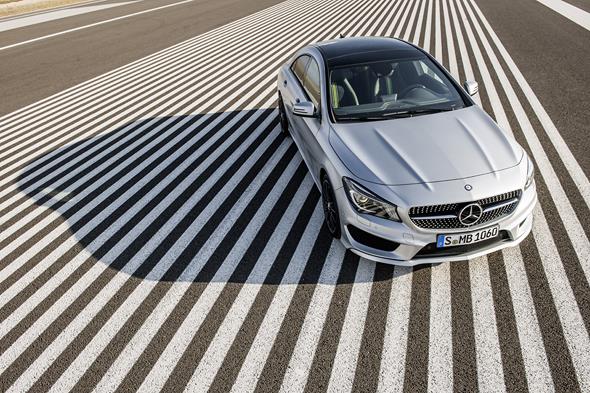
Dynamic in its handling, extremely efficient and of exemplary cleanliness: the CLA 220 CDI, available exclusively in combination with the 7G-DCT dual clutch transmission. The 125 kW (170 hp) top diesel with a displacement of 2.2 litres and a peak torque of 350 Nm, features a weight-optimised crankshaft and, with its individual bearing covers bolted from below and four counterweights, weighs around six kilograms less than an OM 651 of the same displacement, in the longitudinal-installation variant.
The CLA 220 CDI is equipped with a multi-path exhaust gas recirculation system which reduces the nitrogen oxide emission levels.
Already today it meets the Euro 6 exhaust gas standard which will be compulsory from 2015. With 109 g CO2 per km and a combined fuel consumption of 4.2 litres per 100 km, the CLA 220 CDI sets new standards in its segment with 8.2 seconds for the standard sprint and a top speed of 230 km/h, its performance is of sports car level.
At 2.2 litres, the engine is relatively large-displacement, which makes it agile already at low speeds. Mercedes-Benz engine experts call this combination of large-displacement engine and low engine speeds “downspeeding”.
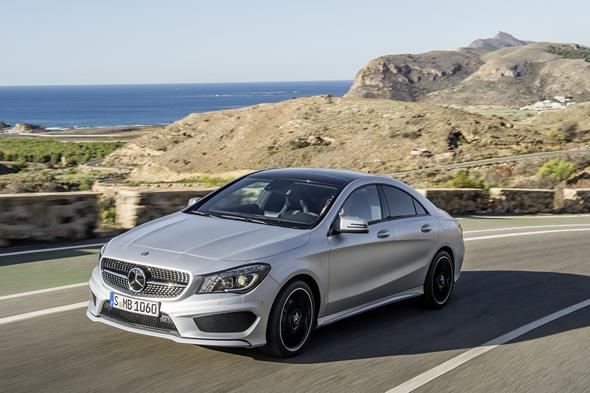
This made it possible for the ECONOMY gearshift program of the 7G‑DCT transmission to be decidedly economical and comfortable. If the driver selects “S”, gearshifts are performed much faster and the ratio spread uses the rpm reserves of the engine for dynamic performance.
The CLA 200 CDI can be ordered from 8 April 2013, the first vehicles will be delivered to customers from September 2013. Its top output is 100 kW (136 hp), its maximum torque, 300 Nm. The displacement was reduced to 1.8 litres by shortening the stroke (83 mm instead of 99 mm).
The significantly longer connecting rods ensure lower transverse friction, and the two Lanchester balancer shafts also have a low-friction design. The single-stage turbocharger has been optimised for efficiency and features adjustable vanes.
With a distance between cylinders of 94 millimetres and cylindrical gears driving the camshafts, transverse installation and the short length required were part of the design specification from the very start.
Overview of technical data for the CLA-Class with diesel engine
| Model | CLA 200 CDI* | CLA 220 CDI** | |
| Number of cylinders/arrangement | 4/in-line | 4/in-line | |
| Displacement | [cc] | 1796 | 2143 |
| Rated output | [kW/hp] at [rpm] | 100/136 3600-4000 | 125/170 3400-4000 |
| Rated torque | [Nm] at [rpm] | 300 1600-3000 | 350 1400-3400 |
| Fuel consumption, combined | [l/100 km] | n/a | 4.2 – 4.5 |
| CO2 emissions, combined | [g/km] | n/a | 109 – 117 |
* available from September 2013, ** with dual clutch transmission (7G-DCT), n/a = no data available yet
The petrol engines
Powerful, responsive and super-clean
Mercedes-Benz has systematically transferred the BlueDIRECT technology from the V6 and V8 engines of the Mercedes-Benz luxury class. The BlueDIRECT four-cylinder petrol engines for the new CLA-Class combine great responsiveness and exemplary power delivery with outstanding efficiency and the best emission figures in this class.
The world-first CAMTRONIC, an innovative valve lift adjustment feature, makes a major contribution to this. There is a choice of 1.6 or 2-litre variants of the new four-cylinder engine family for the CLA-Class, covering a power range from 90 kW (122 hp) and 200 Nm to 155 kW (211 hp) and 350 Nm.
Thanks to BlueDIRECT and highly precise piezo-injection, the new engines already meet the Euro 6 emissions standard for petrol engines coming into force from 2015. Even the much more stringent diesel particulate limit in the Euro 6 standard is already bettered with no additional exhaust aftertreatment.

This was a major motivation for introducing BlueDIRECT into this segment as well. This means that the completely newly developed generation of four-cylinder petrol engines is ideally prepared for the future.
Extremely versatile
The basis for all three petrol engine variants in the new CLA-Class is the all-aluminium M 270 engine with two chain-driven overhead camshafts and four-valve technology. This power unit is extremely versatile, and will also be gradually introduced into larger model series.
In this way it also contributes to a sustained reduction in production costs. The four-cylinder can be installed transversely (M 270) or longitudinally (M 274), and combined with front, rear or 4MATIC all-wheel drive, and also with a manual, automatic torque converter or dual clutch transmission. The ECO start/stop function is always featured as standard.
The BlueDIRECT family has grown: three new petrol engines
The M 270 engine is available in three output levels in the new CLA-Class. As the CLA 180 with a displacement of 1595 cc it develops 90 kW (122 hp) and a maximum torque of 200 newton metres over a wide engine speed range from 1250 to 4000 rpm.
With the basic engine and the 6-speed manual transmission the new CLA-Class accelerates from zero to 100 km/h in 9.3 seconds and has a top speed of up to 210 km/h. The fuel consumption and CO2 emission figures of 5.4 l/100 km, NEDC, combined, and 126 g/km, respectively, are so low that they possibly set a new record.
Thanks to extensive aerodynamic optimisation measures (see the corresponding section), the CLA 180 BlueEFFICIENCY Edition, whose premiere is to be in June, betters even these figures: with 5.0 litres/100 km and 118 g CO2/km, it is among the most frugal cars in its class.
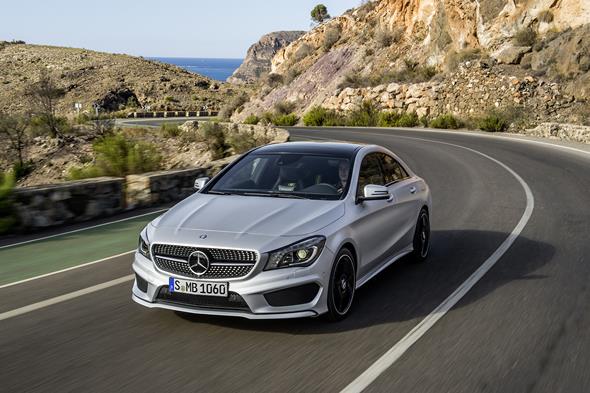
The CLA 200 with the same displacement of 1595 cc develops 115 kW (156 hp) and a maximum torque of 250 Nm, which is likewise available from 1250 to 4000 rpm. It sprints from zero to 100 km/h in 8.6 seconds and has a top speed of 230, but is happy with an average 5.5 l/100 km of fuel, meaning CO2 emissions of 127 g/km.
The CLA 250 is powered by the top engine variant with a displacement of 1991 cc. The engine develops 155 kW (211 hp) and a maximum torque of 350 Nm from 1200 to 4000 rpm. Performance is at sports car level, with acceleration from zero to 100 km/h in 6.7 seconds and a top speed of 240 km/h. Nonetheless it has the best fuel consumption in this class at 6.1 l/100 km, and CO2 emissions of 142 g/km.
All engine variants are designed for customer-friendly operation with E10 premium petrol (95 RON).
Overview of technical data for the CLA-Class with petrol engine
| Model | CLA 180 | CLA 180 BEE* | CLA 200 | CLA 250** | |
| Number of cylinders/arrangement | 4/in-line | 4/in-line | 4/in-line | 4/in-line | |
| Displacement | [cc] | 1595 | 1595 | 1595 | 1991 |
| Rated output | [kW/hp] at [rpm] | 90/122 5000 | 90/122 5000 | 115/156 5300 | 155/211 5500 |
| Rated torque | [Nm] at [rpm] | 200 1250-4000 | 200 1250-4000 | 250 1250-4000 | 350 1200-4000 |
| Fuel consumption, combined | [l/100 km] | 5.4 – 5.6 | 5.0 | 5.5 – 5.7 | 6.1 – 6.2 |
| CO2 emissions, combined | [g/km] | 126 –130 | 118 | 127 – 131 | 142 – 144 |
* BlueEFFICIENCY Edition, ** only available with dual clutch transmission
The transmissions
Shifting comfort combined with efficiency
The 7G-DCT dual clutch transmission and the six-speed manual transmission enable a driving style that is both comfortable and dynamic. Both transmissions are extremely compact and share a series of components with each other.
The 7G-DCT dual clutch transmission is extremely compact, extremely variable with regard to adaptation of the engine speed thanks to seven gears, incorporates an electric oil pump for start/stop capability, shifts gear without any interruptions in tractive power and combines the comfort of an automatic with the efficiency of a manual transmission.
The CLA 250 and the CLA 220 CDI are equipped as standard with the 7G-DCT transmission, it is also optionally available for the CLA 200, CLA 180 (from June) and the CLA 200 CDI (from September).

The manual transmission, designed along similarly compact lines as a three-shaft transmission, is a close relative of the DCT. Extremely easy gear shifting, low shift forces, low internal friction and a low weight are among its most important characteristics.
The 7G-DCT dual clutch transmission: dynamic and efficient
Thanks to its seven gears it offers an exceptionally large spread of up to 7.99. This means that a very short transmission ratio is available when moving off on an uphill slope with a high payload, for example, while during cruising the engine speed can be lowered considerably.
At a length of 367 millimetres and a weight of 86 kilograms, the 7G-DCT is more compact and lighter than the transmissions in this torque class which have been available on the market to date. The clutches take the form of oil-cooled multi-disc clutches.
The specially developed hydraulic fluid is actively cooled, thus ensuring correct functioning of the transmission even under extreme conditions, despite the comparatively low filling level of six litres. Excess engine heat can also be transferred to the transmission, which improves its efficiency.
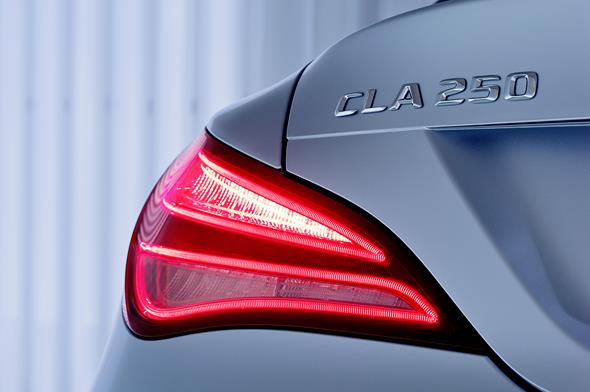
For the first time in this type of unit, the transmission is supplied with oil by two oil pumps – one mechanical and one electric. The electric pump maintains the oil pressure when the engine is switched off via the start/stop function.
This means that the transmission is immediately operational when the engine is restarted and the vehicle can move off again without any delay. In addition, the electric pump is able to support the mechanical pump when peak loads apply, enabling a more compact and efficient design for the mechanical pump.
Another new feature is electric activation of the hydraulics for the parking lock, which is locked by mechanical means. This “park by wire” function enables the transmission selector lever to be positioned as desired: it is located in the form of a steering column lever on the right behind the steering wheel in the CLA-Class.
In combination with the electric parking brake, additional space has thus been created in the centre console for additional stowage facilities.
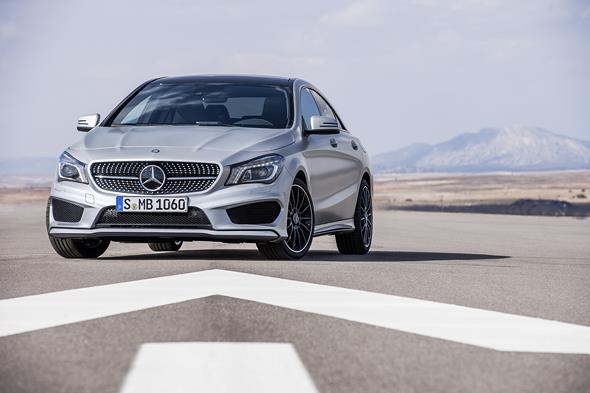
Three gearshift programs are available to the driver:
- ECONOMY: in this mode, the transmission performs gearshifts fully automatically and particularly comfortably. The gears are selected with due regard to a particularly economical style of driving at low revs
- SPORT: the transmission performs gearshifts fully automatically. The shift and response times are shorter, with gearshifts at higher engine speeds
- MANUAL: in this mode, the driver operates the transmission manually via shift paddles behind the steering wheel. The engine speeds at which the gears are shifted can therefore be freely chosen
In ECO or Sport mode, the driver is still able to intervene manually in the gear-shifting process via the shift paddles. The transmission reverts to the selected automatic mode after the paddles have remained inactive for twelve seconds, or after a longer delay when driving downhill or on winding roads. The gear selected is displayed in the instrument cluster and a shift recommendation is made for a fuel-saving driving style.
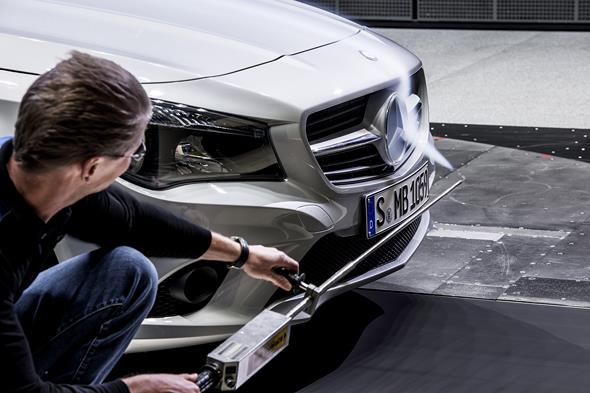
A key factor contributing to the overall efficiency and dynamism of the CLA-Class is the closely coordinated operation of the transmissions and engines. A continuous exchange of data between the control units ensures that the engines run at the ideal operating point at all times. The 7G‑DCT transmission is manufactured at Daimler’s Stuttgart-Hedelfingen plant.
The six-speed manual transmission: convenient manual gear-shifting
The three-shaft transmission is also very compact (length 345 mm) and light (dry weight 46 kg) and incorporates a number of special features for particularly pleasant gearshifting. An integrated magnet on the gearshift shaft is detected by a Hall sensor. The idle position is identified in this way, making the start/stop function possible. The signal for reverse gear activates the reversing lights.
The large spread of 6.7 allows a reduction in engine speed while at the same time ensuring that sufficient tractive power is available when moving off with a fully laden CLA-Class and trailer up to a gross weight of 3.4 tonnes. The clutch is operated hydraulically and the gears are actuated via cables.
The overhead camshaft with third and fourth gears and the reverse gear do not run in the oil bath. This reduces drag torque, thus facilitating gear shifting at low temperatures in particular. The three-cone synchronisation of the first two gears serves the same purpose, while the following gears are provided with two-cone synchronisation.
The weight-optimised cast aluminium shift forks are installed on anti-friction bearings on the shift rods, in order to reduce the shift forces.
The chassis and suspension
In the service of dynamism
The chassis of the CLA features a McPherson front axle and an independent multilink rear suspension, featuring three control arms and one trailing arm per wheel. This means that longitudinal and lateral dynamics are virtually independent of one another. Direct Steer is standard for all versions.
A CLA-specific feature is the elastic decoupling of the rear axle carrier, which benefits ride comfort. The measures include rubber bearings vulcanised onto the anti-roll bar and the elastomer coating of the coil springs, which produces an effective noise de-coupling between the vehicle body and rear axle.
The connection of the damper to the vehicle body is via an aluminium bearing with a soft universal joint that contributes to reducing friction in the damper, and consequently helps responsiveness. Wheel carriers and spring links are made of aluminium, in order to reduce the unsprung masses.
Two suspension set-ups are available: the comfort suspension and the optional sports suspension for sporty yet comfortable handling. The latter entails lowering of the body by 15 mm (front) and 10 mm (rear).
Irrespective of the selected chassis, all CLA variants come with the Direct Steer system. This electromechanical power steering offers improved feedback to the driver in comparison to conventional systems and makes an important contribution towards overall efficiency, as the steering assist function only requires energy when the steering wheel is actually turned.
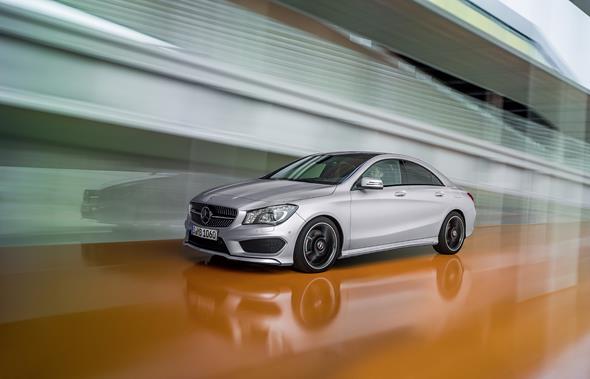
Additionally it enables various steering assistance functions which are activated by the ESP® control unit. These include countersteering in case of oversteering, corrective steering when braking on road surfaces offering different levels of grip (split-friction braking), mitigation of the extent to which the front-wheel drive influences the steering and compensation for crosswind and road gradients.
With all engine variants, the CLA-Class comes with disc brakes on all wheels. The callipers on the rear axle and the brake boosters are made of aluminium. A particularly convenient feature is the HOLD function, which is familiar from the larger model series: when stopping, for example at traffic lights, the driver merely has to press the brake pedal slightly more firmly and the brake will remain engaged until they move off again.
The brake is released automatically when the driver steps on the accelerator. On versions with manual transmission, the Hill Hold function automatically prevents the vehicle from rolling back unintentionally when moving off on a slope.
The CLA-Class is equipped with an electric parking brake, which operates by means of actuator motors acting on the callipers of the rear axle. The parking brake is activated via a button under the light switch on the left of the dashboard. This creates additional space in the centre console, as the handbrake lever is no longer required.
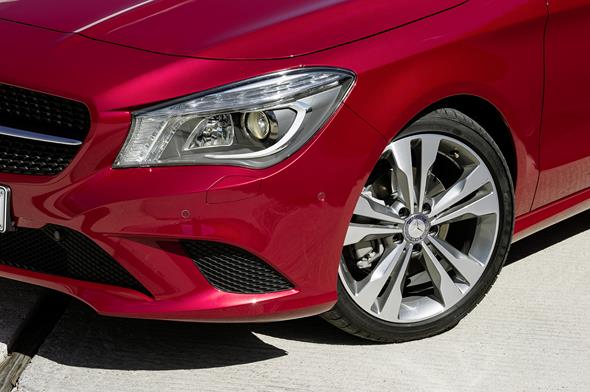
When the button is pressed at speeds of over four km/h, the parking brake acts as an emergency brake, activating all four wheel brakes via the ESP®‘s hydraulic unit.
In conjunction with the 7G-DCT automatic transmission, the parking brake offers a particularly convenient mode of functioning: when the driver accelerates sufficiently after fastening their seat belt, the parking brake is released automatically.
The 4MATIC all-wheel drive system
Extraordinary agility and high traction reserves
The CLA from Mercedes-Benz is available with a new variant of the 4MATIC permanent all-wheel drive system featuring fully variable torque distribution. Similar to the other 4MATIC versions, this new development boasts high tractive power reserves and outstanding agility combined with superlative driving safety and energy efficiency.
The most innovative components of the new 4MATIC include the power take-off to the rear axle which is integrated in the 7G-DCT automated dual clutch transmission and the rear-axle gear unit with integrated, electrohydraulically controlled multi-disc clutch.
This set-up enables fully variable distribution of the drive torque between front and rear axle. Additional benefits of this design are a lower system weight than is available from the competition and high efficiency. Similar to the front-wheel drive versions, all 4MATIC models also boast good energy efficiency.
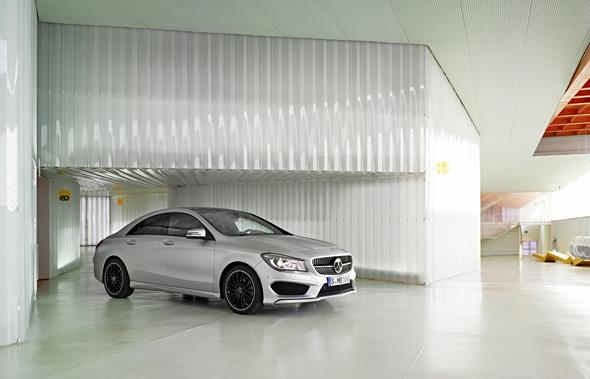
The 4MATIC all-wheel drive system is a completely new development and was specifically adjusted to the requirements of the new front-wheel drive models.
Integrated power take-off unit (PTU) channels power to the rear axle
The new 4MATIC is combined with the 7G-DCT seven-speed automated dual clutch transmission. The power flow to the rear powertrain is provided by a compact power take-off unit (PTU) which is fully integrated into the main transmission and is supplied with lubricant from the latter’s oil circuit.
This configuration gives rise to substantial weight advantages of up to 25 percent over competitor systems which branch off power by means of an add-on component with its own oil circuit. Together with the friction-minimised tapered roller bearings, the PTU achieves an excellent level of efficiency.
Completely new development with torque-on-demand rear axle
The electrohydraulically actuated multi-disc clutch integrated into the rear-axle gear unit is responsible for fully variable torque distribution. Fundamental operating principle: when the multi-disc clutch is open, the car is driven almost exclusively by the front axle.
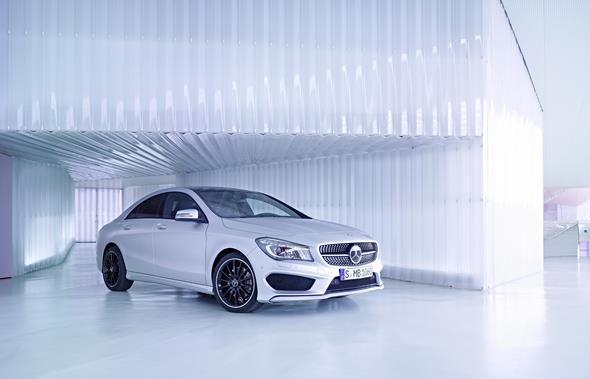
When the clutch is closed, the rear axle comes into play. However, the drive torque can be shifted in fully variable mode between front and rear axle according to the given situation (torque on demand).
The system pressure to activate the rear axle is supplied in milliseconds by the rotor pump which is integrated into the rear-axle gear unit. The pump is activated automatically as soon as only minimal speed differences arise between front and rear axles. Pressure control is performed by a proportioning valve under the control of the ESP®.
Motoring enjoyment thanks to intelligent control systems
The 4MATIC is activated according to the basic principle of “as often as necessary, as rarely as possible”. This means that when the underlying conditions allow, the all-wheel drive models run almost exclusively in particularly economical front-wheel drive mode.
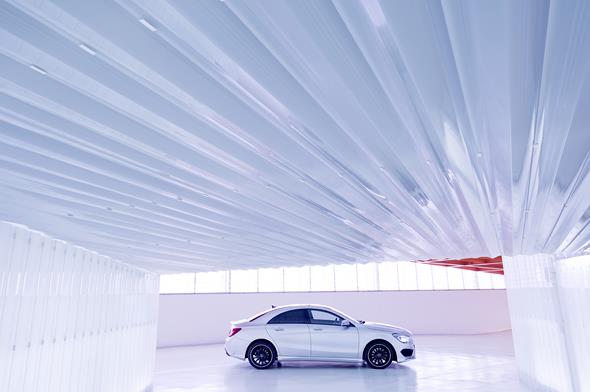
As soon as the driving situation requires, drive torque is channelled to the rear axle as appropriate. The reverse process takes place just as quickly: as soon as additional drive torque is no longer necessary at the rear axle – e.g. in case of heavy braking manoeuvres with ABS intervention – the rear powertrain is deactivated and torque is reduced to zero.
In case of impending understeer or oversteer under load, the drive torque is first of all distributed such as to stabilise the vehicle. Only if these measures fail to have a stabilising effect do the control systems adapted to 4MATIC conditions, such as ESP® or 4ETS, intervene to keep the vehicle on course.
With this strategy, the developers have managed to combine two key requirements defined in the performance specifications: optimum energy efficiency coupled with maximum driving dynamics and driving safety.
Individual: transmission modes to suit personal driving styles
The torque distribution ratio is also dependent on the activated shift program of the 7G-DCT dual clutch transmission. The ECO mode results in torque distribution of a conservative nature.
Less torque is channelled to the rear axle, resulting in gentler handling and supporting an economical driving style at lower revs. In SPORT or MANUAL mode, the activation times are shortened and more torque is distributed to the rear axle in the interests of a dynamic, sporty driving style.

Multimedia systems
A fresh look, more convenient operation, new functionalities
The latest multimedia generation deployed in the CLA boasts new functions, additional apps and a modified graphic colour scheme. The coupé is equipped as standard with the Audio 20 CD system, which features among other things a twin tuner and an MP3-capable CD player.
Daimler’s Digital Drive Style app concept, which together with the Drive Kit Plus for the iPhone® enables seamless integration of the iPhone® into the vehicle, has been extended.
The highlights include Siri voice control and Glympse real-time location sharing. Glympse enables the user to share his or her current location with selected persons.
Other functions are Facebook®, Twitter®, internet radio, AUPEO!™ Personal Radio and the advanced navigation solution from Garmin® with web-based real-time traffic information, online special destination search including Street View™ and 3D map display.
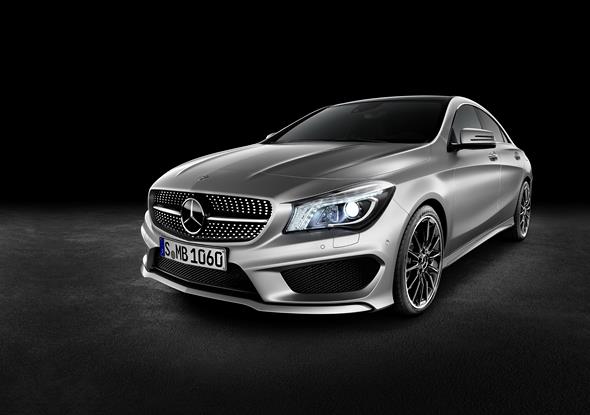
Overview of other multimedia systems
The COMAND Online multimedia system has also been extended to incorporate additional functions. The latest generation offers improved, photo-realistic map display, an additional Bluetooth profile (to enable the internet to be accessed by iPhone®, for example), the display of images additionally in bmp and png formats and the real-time transfer of traffic data.
COMAND Online offers internet access. Customers can either surf the web as they wish while the car is stationary or call up a Mercedes-Benz app whose particularly fast page loading and simple operation make it suitable for use while driving.
Integrated apps include Google™ Local Search and Weather and the facility for downloading a route which has previously been configured on a PC using Google Maps and transmitted to the car.
In addition, apps for Google™ Streetview and Google™ Panoramio are available for COMAND Online. Streetview enables locations all over the world to be seen in 360-degree perspective views and at street level.
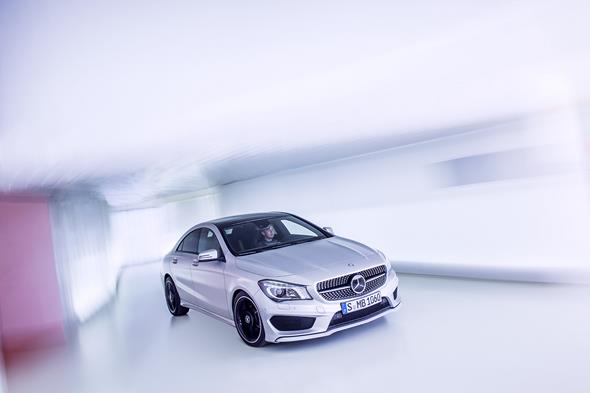
Panoramio allows access to millions of photographs which have been taken and uploaded by other uses at locations all around the globe. Streetview and Panoramio thus provide comprehensive means of studying routes and checking out sights and destinations before embarking on a journey. With the “News” app, news on politics, finance and technology can be called up online in the vehicle.
Information is displayed in such a way that it is particularly easy to read. Further apps, such as stock market news or a parking space finder, can be also be accessed via the Mercedes online shop (www.shop.mercedes-benz.com).
The high-resolution colour display has a diagonal of 17.8 cm. The basic colour scheme of the central display is silver grey. Photos can be shown on the large screen and scrolled through manually, as in a slide show.
Where the audio equipment is concerned, too, new types of representation bring a fresh look and more convenient operation. The new cover flow function, for instance, sorts the title images of the music albums stored in a carousel-like form, so that the CLA-Class driver can easily leaf through their music collection – even if it is rather on the large side: the memory for compressed audio files (mp3, wma and aac formats) is now 10 GB in size.
Greatest convenience is afforded by the Music Search function, which enables drivers and passengers to search the hard disc, SD memory cards, USB sticks, CDs and DVDs for specific music tracks and artists.
The search can be according to various criteria, for instance album, music category or composer. If a name needs to be entered, the software will also tolerate spelling mistakes. The driver is therefore able to devote their full attention to the traffic. As a further advantage, the occupants are able to search all the connected media and devices simultaneously.
The fast hard-disc navigation system of COMAND Online also has added functions. New features include a 3D display with three-dimensional city views. Also new: routes covered can be recorded and repeated later, specific personal destinations can be imported via an SD card and four alternative routes can be displayed on the navigation map, one of them a particularly economical variation.
Mercedes-Benz customers in Europe receive the current cards for their COMAND Online multimedia system free of charge for three years. Authorised Mercedes-Benz dealers upload the updates for navigation data in 39 European countries into the navigation system when the customer visits their premises.
In Europe, COMAND Online also comprises Speed Limit Assist, which receives its information for traffic sign recognition via a camera and navigation database. COMAND Online also includes the LINGUATRONIC voice-operated control system for audio, telephone and navigation.
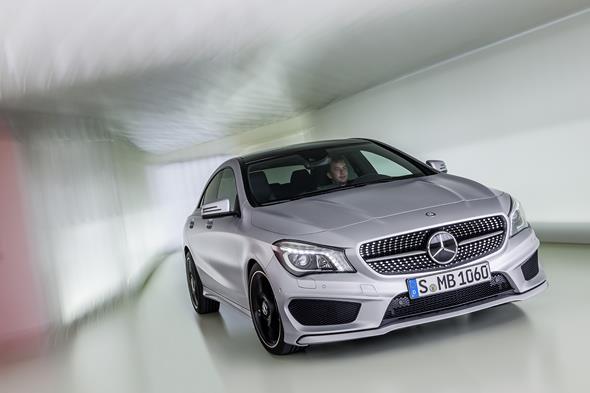
The new “one shot” input function for the navigation system is particularly convenient, whereby the place and road can be spoken directly after one another. This function is currently available in seven languages and significantly enhances ease of operation.
With COMAND Online and LINGUATRONIC, music can also be conveniently searched for in the CLA-Class via voice control. The system first asks in which category it should conduct the search (artist, title, year).
The category is selected by saying it or by saying the row number of the relevant category which appears on the screen. This is then followed by further questions about title, artist or album.
The standard specification includes the Audio 20 CD system. It features a twin tuner, mp3-capable CD player and a USB connector in the centre console. The colour display has a diagonal of 14.7 cm. Thanks to a “cover art” function, the title images of the music albums currently being played are shown if their details are stored in the audio file.
A top line in the Audio 20 CD’s menu navigation makes orientation easier and can be operated via the controller.
The settings for the air conditioning are also displayed on the telematics screen (when in use), as is the fuel consumption over the past 15 minutes. Bluetooth® functions have also been extended: the mobile’s phone book can now be automatically transferred en bloc when connected, and wireless music reproduction is possible from Bluetooth-capable terminals. Plus text messages can also be displayed.
As an optional extra the Audio 20 CD can be combined with a 6-disc CD changer, Media Interface, harman/kardon® sound system, Convenience Telephony in the armrest, digital radio (DAB) and the new Becker® MAP PILOT entry-level navigation solution.
The Becker® MAP PILOT makes a low-cost navigation function, which can also be retrofitted, available for the entry-level Audio 20 CD radio. Its advantages over aftermarket solutions include integrated operation via the central controls, voice output via the vehicle’s loudspeakers, display on the Audio 20 screen, a concealed location in the glove compartment and updating via an internet portal.
Mercedes-Benz developed the “Logic7®” surround sound system together with audio specialists harman/kardon®. Based on technology never before seen in a car, this high-end system delivers three-dimensional sound as a natural 360-degree musical experience for all passengers.
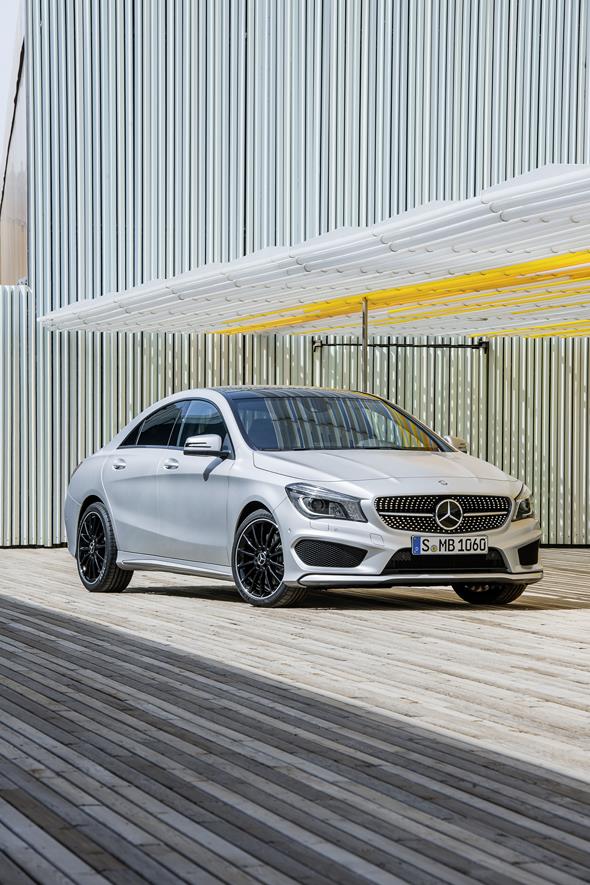
The audio signals are distributed via a 450-watt multi-channel DSP amplifier connected to twelve high-performance loudspeakers. In conjunction with COMAND Online a multichannel listening experience with Dolby Digital 5.1 and DTS is possible.
The Media Interface is available as an optional extra. The universal interface enables mobile audio devices such as an mp3 player or iPod® to be connected to the vehicle’s telematics system. These devices are then operated via the head unit, the central control unit or the steering wheel buttons. By making use of USB 2.0, the new generation of the Media Interface provides quicker display and an expanded data selection.
Production
A new car from a new factory
The Mercedes-Benz CLA is the first car to be built exclusively at the new production facilities in Kecskemét, Hungary. The factory was inaugurated in the spring of 2012, and production of the CLA started in January 2013.
On the occasion of the start of production Dr. Dieter Zetsche, Head of Mercedes-Benz Cars said: “You are doing a great job at the plant here.” Before the start of production of the CLA-Class over 40,000 B-Class vehicles rolled off the assembly line at the Hungarian production facilities, helping to make 2012 the best sales year for the B-Class so far (sales worldwide: 145,649 units, over 11 percent more than the previous record year of 2006).
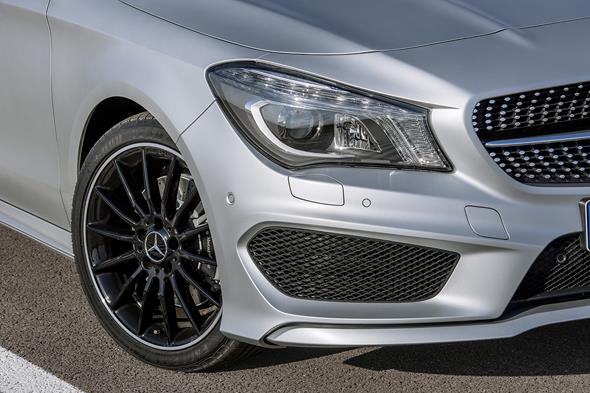
Plant manager Frank Klein added: “The plant’s entire team can’t wait to get the CLA to our customers as perfectly as the B-Class cars we build in Kecskemét.”
The Kecskemét plant and the Rastatt plant together form the production network for the new generation of Mercedes-Benz compact cars. That network significantly contributes to the overall economies of compact car production and allows the flexible and optimum management of the capacity utilisation of both plants.
The Kecskemét plant was opened in March 2012, less than four years after the initial decision was made in the summer of 2008 in favour of the location. It has since produced the B-Class, which is also built in Rastatt, using state-of-the-art, environmentally sound technology.
Since its inauguration, the number of staff has grown from about 2,500 to more than 3,000, in line with the further development of the plant and the preparations for production of the CLA. The plant is the most attractive employer in the region, not least due to the high attention given to the qualification of its employees.
The pioneering efforts of the plant and its Hungarian partners to establish dual vocational and university education based on the German model further contribute to this. In 2012 Daimler AG and the Hungarian Government also signed a joint partnership agreement to establish and reinforce the region of Kecskemét as a centre of the Hungarian automobile industry on a long-term basis.
Mercedes-Benz CLA 220 CDI
Engine
| Number of cylinders/arrangement | 4/in-line, 4 valves per cylinder | |
| Displacement | cc | 2143 |
| Bore x stroke | mm | 83.0 x 99.0 |
| Rated output | kw/hp | 125/170 at 3400-4000 rpm |
| Rated torque | Nm | 350 at 1400-3400 rpm |
| Compression ratio | 16.2:1 | |
| Mixture formation | High-pressure fuel injection with common-rail technology, VTG turbocharger, EDC |
Power transmission
| Transmission | Dual clutch transmission | |
| Gear ratios | Final drive 1Final drive 21st gear2nd gear3rd gear4th gear 5th gear 6th gear 7th gear Reverse | 4.133 (1st, 2nd, 4th, 5th and reverse gears)2.385 (3rd, 6th and 7th gears)3.862.432.671.05 0.78 1.05 0.84 3.38 |
Chassis and suspension
| Front axle | McPherson suspension with spring strut and wishbone, coil springs, gas pressure shock absorber, stabilizer bar |
| Rear axle | Four-link rear axle, coil springs, gas pressure shock absorber, stabilizer bar |
| Braking system | Internally ventilated disc brakes at front, solid disc brakes at rear, electric parking brake, ABS, Brake Assist, ESP® |
| Steering | Electromechanical rack-and-pinion power steering |
| Wheels | 6.5 J x 16 |
| Tyres | 205/55 R 16 V |
Dimensions and weights
| Wheelbase | mm | 2699 |
| Track front/rear | mm | 1549/1547 |
| Overall length | mm | 4630 |
| Overall width | mm | 1777 |
| Overall height | mm | 1432 |
| Turning circle | m | 11.0 |
| Boot capacity max.* | l | 470 |
| Kerb weight acc. to EC | kg | 1525 |
| Payload | kg | 480 |
| Permissible gross vehicle weight | kg | 2005 |
| Tank capacity/of which reserve | l | 50/6 |
Performance and fuel consumption
| Acceleration 0-100 km/h | s | 8.2 |
| Top speed | km/h | 230 |
| Fuel consumption comb. | l/100 km | 4.2 – 4.5 |
| CO2 emissions | g/km | 109-117 |
*acc. to VDA measuring method
Mercedes-Benz CLA 180
Engine
| Number of cylinders/arrangement | 4/in-line, 4 valves per cylinder | |
| Displacement | cc | 1595 |
| Bore x stroke | mm | 83.0 x 73.7 |
| Rated output | kw/hp | 90/122 at 5000 rpm |
| Rated torque | Nm | 200 at 1250-4000 rpm |
| Compression ratio | 10.3:1 | |
| Mixture formation | Electronically controlled direct petrol injection with piezo injectors, exhaust gas turbocharger |
Power transmission
| Transmission | Six-speed manual transmission | |
| Gear ratios | Final drive 1Final drive 21st gear2nd gear3rd gear4th gear 5th gear 6th gear Reverse | 3.35 (1st, 2nd, 5th and 6th gears)3.85 (3rd, 4th and reverse gears)4.312.441.350.94 0.82 0.70 3.38 |
Chassis and suspension
| Front axle | McPherson suspension with spring strut and wishbone, coil springs, gas pressure shock absorber, stabilizer bar |
| Rear axle | Four-link rear axle, coil springs, gas pressure shock absorber, stabilizer bar |
| Braking system | Internally ventilated disc brakes at front, solid disc brakes at rear, electric parking brake, ABS, Brake Assist, ESP® |
| Steering | Electromechanical rack-and-pinion power steering |
| Wheels | 6.5 J x 16 |
| Tyres | 205/55 R 16 V |
Dimensions and weights
| Wheelbase | mm | 2699 |
| Track front/rear | mm | 1549/1547 |
| Overall length | mm | 4630 |
| Overall width | mm | 1777 |
| Overall height | mm | 1432 |
| Turning circle | m | 11.0 |
| Boot capacity max.* | l | 470 |
| Kerb weight acc. to EC | kg | 1395 |
| Payload | kg | 525 |
| Permissible gross vehicle weight | kg | 1920 |
| Tank capacity/of which reserve | l | 50/6 |
Performance and fuel consumption
| Acceleration 0-100 km/h | s | 9.3 |
| Top speed | km/h | 210 |
| Fuel consumption comb. | l/100 km | 5.4-5.6 |
| CO2 emissions | g/km | 126-130 |
*acc. to VDA measuring method
Mercedes-Benz CLA 180 BlueEFFICIENCY Edition
Engine
| Number of cylinders/arrangement | 4/in-line, 4 valves per cylinder | |
| Displacement | cc | 1595 |
| Bore x stroke | mm | 83.0 x 73.7 |
| Rated output | kw/hp | 90/122 at 5000 rpm |
| Rated torque | Nm | 200 at 1250-4000 rpm |
| Compression ratio | 10.3:1 | |
| Mixture formation | Electronically controlled direct petrol injection with piezo injectors, exhaust gas turbocharger |
Power transmission
| Transmission | Six-speed manual transmission | |
| Gear ratios | Final drive 1Final drive 21st gear2nd gear3rd gear4th gear 5th gear 6th gear Reverse | 3.67 (1st, 2nd, 5th and 6th gears)4.28 (3rd, 4th and reverse gears)3.942.041.090.76 0.67 0.6 3.2 |
Chassis and suspension
| Front axle | McPherson suspension with spring strut and wishbone, coil springs, gas pressure shock absorber, stabilizer bar |
| Rear axle | Four-link rear axle, coil springs, gas pressure shock absorber, stabilizer bar |
| Braking system | Internally ventilated disc brakes at front, solid disc brakes at rear, electric parking brake, ABS, Brake Assist, ESP® |
| Steering | Electromechanical rack-and-pinion power steering |
| Wheels | 6.5 J x 15 |
| Tyres | 195/65 R 15 T |
Dimensions and weights
| Wheelbase | mm | 2699 |
| Track front/rear | mm | 1549/1547 |
| Overall length | mm | 4630 |
| Overall width | mm | 1777 |
| Overall height | mm | 1432 |
| Turning circle | m | 11.0 |
| Boot capacity max.* | l | 470 |
| Kerb weight acc. to EC | kg | 1390 |
| Payload | kg | 460 |
| Permissible gross vehicle weight | kg | 1850 |
| Tank capacity/of which reserve | l | 40/6 |
Performance and fuel consumption
| Acceleration 0-100 km/h | s | 9.9 |
| Top speed | km/h | 190 |
| Fuel consumption comb. | l/100 km | 5.0 |
| CO2 emissions | g/km | 118 |
*acc. to VDA measuring method
Mercedes-Benz CLA 200
Engine
| Number of cylinders/arrangement | 4/in-line, 4 valves per cylinder | |
| Displacement | cc | 1595 |
| Bore x stroke | mm | 83.0 x 73.7 |
| Rated output | kw/hp | 115/156 at 5300 rpm |
| Rated torque | Nm | 250 at 1250-4000 rpm |
| Compression ratio | 10.3:1 | |
| Mixture formation | Electronically controlled direct petrol injection with piezo injectors, exhaust gas turbocharger |
Power transmission
| Transmission | Six-speed manual transmission | |
| Gear ratios | Final drive 1Final drive 21st gear2nd gear3rd gear4th gear 5th gear 6th gear Reverse | 3.35 (1st, 2nd, 5th and 6th gears)3.85 (3rd, 4th and reverse gears)4.312.441.350.94 0.82 0.70 3.37 |
Chassis and suspension
| Front axle | McPherson suspension with spring strut and wishbone, coil springs, gas pressure shock absorber, stabilizer bar |
| Rear axle | Four-link rear axle, coil springs, gas pressure shock absorber, stabilizer bar |
| Braking system | Internally ventilated disc brakes at front, solid disc brakes at rear, electric parking brake, ABS, Brake Assist, ESP® |
| Steering | Electromechanical rack-and-pinion power steering |
| Wheels | 6.5 J x 16 |
| Tyres | 205/55 R 16 V |
Dimensions and weights
| Wheelbase | mm | 2699 |
| Track front/rear | mm | 1549/1547 |
| Overall length | mm | 4630 |
| Overall width | mm | 1777 |
| Overall height | mm | 1432 |
| Turning circle | m | 11.0 |
| Boot capacity max.* | l | 470 |
| Kerb weight acc. to EC | kg | 1395 |
| Payload | kg | 525 |
| Permissible gross vehicle weight | kg | 1920 |
| Tank capacity/of which reserve | l | 50/6 |
Performance and fuel consumption
| Acceleration 0-100 km/h | s | 8.6 |
| Top speed | km/h | 230 |
| Fuel consumption comb. | l/100 km | 5.5-5.7 |
| CO2 emissions | g/km | 127-131 |
*acc. to VDA measuring method
Mercedes-Benz CLA 250
Engine
| Number of cylinders/arrangement | 4/in-line, 4 valves per cylinder | |
| Displacement | cc | 1991 |
| Bore x stroke | mm | 83.0 x 92.0 |
| Rated output | kw/hp | 155/211 at 5500 rpm |
| Rated torque | Nm | 350 at 1200-4000 rpm |
| Compression ratio | 9.8:1 | |
| Mixture formation | Electronically controlled direct petrol injection with piezo injectors, exhaust gas turbocharger |
Power transmission
| Transmission | Dual clutch transmission | |
| Gear ratios | Final drive 1Final drive 21st gear2nd gear3rd gear4th gear 5th gear 6th gear 7th gear Reverse | 4.133 (1st, 2nd, 4th, 5th and reverse gears)2.385 (3rd, 6th and 7th gears)3.862.432.671.05 0.78 1.05 0.84 3.38 |
Chassis and suspension
| Front axle | McPherson suspension with spring strut and wishbone, coil springs, gas pressure shock absorber, stabilizer bar |
| Rear axle | Four-link rear axle, coil springs, gas pressure shock absorber, stabilizer bar |
| Braking system | Internally ventilated disc brakes at front, solid disc brakes at rear, electric parking brake, ABS, Brake Assist, ESP® |
| Steering | Electromechanical rack-and-pinion power steering |
| Wheels | 7.5 J x 17 |
| Tyres | 225/45 R 17V |
Dimensions and weights
| Wheelbase | mm | 2699 |
| Track front/rear | mm | 1542/1541 |
| Overall length | mm | 4630 |
| Overall width | mm | 1777 |
| Overall height | mm | 1436 |
| Turning circle | m | 11.0 |
| Boot capacity max.* | l | 470 |
| Kerb weight acc. to EC | kg | 1480 |
| Payload | kg | 485 |
| Permissible gross vehicle weight | kg | 1965 |
| Tank capacity/of which reserve | l | 50/6 |
Performance and fuel consumption
| Acceleration 0-100 km/h | s | 6.7 |
| Top speed | km/h | 240 |
| Fuel consumption comb. | l/100 km | 6.1-6.2 |
| CO2 emissions | g/km | 142-144 |
*acc. to VDA measuring method
